American History Books
A list of American History books that are a must read for those interested in examining the rich history of our nation.
-KMN
-KMN
Comprehensive Overviews
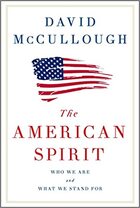
The American Spirit: Who We Are and What We Stand For
by David McCullough A timely collection of speeches by David McCullough, the most honored historian in the United States—winner of two Pulitzer Prizes, two National Book Awards, and the Presidential Medal of Freedom, among many others—that reminds us of fundamental American principles. Over the course of his distinguished career, David McCullough has spoken before Congress, the White House, colleges and universities, historical societies, and other esteemed institutions. Now, at a time of self-reflection in America following a bitter election campaign that has left the country divided, McCullough has collected some of his most important speeches in a brief volume designed to identify important principles and characteristics that are particularly American. The American Spirit reminds us of core American values to which we all subscribe, regardless of which region we live in, which political party we identify with, or our ethnic background. This is a book about America for all Americans that reminds us who we are and helps to guide us as we find our way forward. 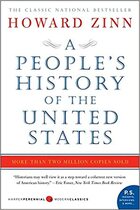
A People's History of the United States
by Howard Zinn “It’s a wonderful, splendid book—a book that should be read by every American, student or otherwise, who wants to understand his country, its true history, and its hope for the future.” —Howard Fast, author of Spartacus and The Immigrants“[It] should be required reading.” —Eric Foner, New York Times Book Review Library Journal calls Howard Zinn’s iconic A People's History of the United States “a brilliant and moving history of the American people from the point of view of those…whose plight has been largely omitted from most histories.” Packed with vivid details and telling quotations, Zinn’s award-winning classic continues to revolutionize the way American history is taught and remembered. Frequent appearances in popular media such as The Sopranos, The Simpsons, Good Will Hunting, and the History Channel documentary The People Speak testify to Zinn’s ability to bridge the generation gap with enduring insights into the birth, development, and destiny of the nation. 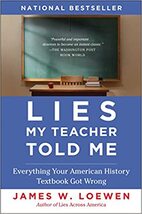
Lies My Teacher Told Me: Everything Your American History Textbook Got Wrong
by James W. Loewen This updated and revised edition of the American Book Award-winner and national bestseller revitalizes the truth of America’s history, explores how myths continue to be perpetrated, and includes a new chapter on 9/11 and the Iraq War. Americans have lost touch with their history, and in Lies My Teacher Told Me Professor James Loewen shows why. After surveying eighteen leading high school American history texts, he has concluded that not one does a decent job of making history interesting or memorable. Marred by an embarrassing combination of blind patriotism, mindless optimism, sheer misinformation, and outright lies, these books omit almost all the ambiguity, passion, conflict, and drama from our past. In this revised edition, packed with updated material, Loewen explores how historical myths continue to be perpetuated in today's climate and adds an eye-opening chapter on the lies surrounding 9/11 and the Iraq War. From the truth about Columbus's historic voyages to an honest evaluation of our national leaders, Loewen revives our history, restoring the vitality and relevance it truly possesses. Thought provoking, nonpartisan, and often shocking, Loewen unveils the real America in this iconoclastic classic beloved by high school teachers, history buffs, and enlightened citizens across the country. |
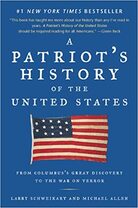
A Patriot's History of the United States: From Columbus's Great Discovery to the War on Terror
by Larry Schweikart, Michael Allen For the past three decades, many history professors have allowed their biases to distort the way America’s past is taught. These intellectuals have searched for instances of racism, sexism, and bigotry in our history while downplaying the greatness of America’s patriots and the achievements of "dead white men." As a result, more emphasis is placed on Harriet Tubman than on George Washington; more about the internment of Japanese Americans during World War II than about D-Day or Iwo Jima; more on the dangers we faced from Joseph McCarthy than those we faced from Josef Stalin. A Patriot’s History of the United States corrects those doctrinaire biases. In this groundbreaking book, America’s discovery, founding, and development are reexamined with an appreciation for the elements of public virtue, personal liberty, and private property that make this nation uniquely successful. This book offers a long-overdue acknowledgment of America’s true and proud history. 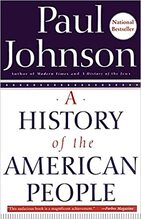
A History of the American People
by Paul Johnson "The creation of the United States of America is the greatest of all human adventures," begins Paul Johnson. "No other national story holds such tremendous lessons, for the American people themselves and for the rest of mankind." In his prize-winning classic, Johnson presents an in-depth portrait of American history from the first colonial settlements to the Clinton administration. This is the story of the men and women who shaped and led the nation and the ordinary people who collectively created its unique character. Littered with letters, diaries, and recorded conversations, it details the origins of their struggles for independence and nationhood, their heroic efforts and sacrifices to deal with the 'organic sin’ of slavery and the preservation of the Union to its explosive economic growth and emergence as a world power. Johnson discusses contemporary topics such as the politics of racism, education, the power of the press, political correctness, the growth of litigation, and the influence of women throughout history. He sees Americans as a problem-solving people and the story of their country as "essentially one of difficulties being overcome by intelligence and skill, by faith and strength of purpose, by courage and persistence... Looking back on its past, and forward to its future, the auguries are that it will not disappoint humanity." Sometimes controversial and always provocative, A HISTORY OF THE AMERICAN PEOPLE is one author’s challenging and unique interpretation of American history. Johnson’s views of individuals, events, themes, and issues are original, critical, and in the end admiring, for he is, above all, a strong believer in the history and the destiny of the American people. 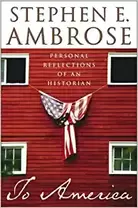
To America: Personal Reflections of an Historian
by Stephen E. Ambrose Ambrose roams the country's history, praising the men and women who made it exceptional. He considers Jefferson and Washington, who were progressive thinkers (while living a contradiction as slaveholders), and celebrates Lincoln and Roosevelt. He recounts Andrew Jackson's stunning defeat of a superior British force in the battle of New Orleans with a ragtag army in the War of 1812. He brings to life Lewis and Clark's grueling journey across the wilderness and the building of the railroad that joined the nation coast to coast. Taking swings at political correctness, as well as his own early biases, Ambrose grapples with the country's historic sins of racism; its ill treatment of Native Americans; and its tragic errors such as the war in Vietnam, which he ardently opposed. He contrasts the modern presidencies of Eisenhower, Kennedy, Nixon, and Johnson. He considers women's and civil rights, immigration, philanthropy, and nation building. Most powerfully, in this final volume, Ambrose offers an accolade to the historian's mighty calling. |
American Historians
Wikipedia: Historians of the United States
- Henry Adams (1838–1918) – history of the United States in the presidential administrations of Thomas Jefferson and James Madison
- Stephen Ambrose (1936–2002) – biographer of Presidents Dwight D. Eisenhower and Richard M. Nixon
- Edward L. Ayers (born 1953) – U.S. South, founder of the Institute for Advanced Technology in the Humanities (IATH) and Digital Scholarship Lab
- George Bancroft (1800–1891) – wrote first large-scale history of the US
- Charles A. Beard (1874–1948) – revisionist history of Founding Fathers suggesting monetary motivations
- Samuel Flagg Bemis (1891–1973) – U.S. foreign policy; won two Pulitzer Prizes
- Ira Berlin (1941–2018) - Slavery
- William Brandon (1914–2002) – historian of the American West and Native Americans.
- Alan Brinkley (1949–2019) – historian of the Great Depression
- David H. Burton - U.S. historian and biographer of presidents Theodore Roosevelt and William Howard Taft as well as Clara Barton and Oliver Wendell Holmes Jr.
- Bruce Catton (1899–1978) – American Civil War
- William Cronon (born 1954) – American environmental history, the frontier in New England, and the American West
- J. Frank Dobie (1888–1964) – historian of Texas and the Southwestern United States
- David Herbert Donald (1920–2009)
- W. E. B. Du Bois (1868–1963) – historian of the Reconstruction
- Drew Gilpin Faust (born 1947) – Civil War, culture of death, and the Confederacy
- Robert H. Ferrell (1921–2018) – Harry S. Truman, the 20th-century U.S. presidency, World War I
- Eric Foner (born 1943) – Civil War and Reconstruction
- Shelby Foote (1916–2005) – American Civil War
- John Hope Franklin (1915–2009) – historian of African Americans
- John A. Garraty (1920–2007) – biography
- Elizabeth Fox-Genovese (1941–2007) – Southern slavery, women's history
- Doris Kearns Goodwin (born 1943) - U.S. Presidents, won a Pulitzer Prize in 1995 for No Ordinary Time: Franklin and Eleanor Roosevelt: The Home Front in World War II
- Richard Hofstadter (1916–1970) – Progressivism and U.S. political history
- Daniel Walker Howe - political and intellectual history of the early republic and antebellum period
- Peter Iverson – 20th century U.S. West/Native American history (emphasis in Navajo history)
- Paul Johnson (born 1928) – author of A History of the American People and a biographer of George Washington
- Winthrop Jordan (1931–2007) – African-American history
- David Lavender (1910–2003) – Western U.S.
- David McCullough (born 1933) – general study, most notable work is recent biography of John Adams
- James M. McPherson (born 1936) – American Civil War
- Pauline Maier (1938–2013) – late Colonial, Revolution, Constitution
- D. W. Meinig (born 1924) – geographic history of America
- Philip D. Morgan (born 1949) – slavery
- David Nasaw (born 1945) – biography and U.S. cultural history
- Francis Parkman (1823–1893) – historian of the French and Indian War
- William B. Pickett (born 1940)
- Dominic Sandbrook (born 1974) – political history of the 1960s and 1970s
- Arthur Schlesinger Sr. (1888–1965)
- Arthur Schlesinger Jr. (1917–2007)
- Cornelius Cole Smith, Jr. (1913–2004) – historian of Arizona, California and the Southwestern United States
- Jean Edward Smith (1932–2019) – biography, foreign policy, political economy, constitutional law, legal history, and politics
- Irma Tam Soong (1912–2001) – history of Chinese immigration in Hawaii
- Frederick Jackson Turner (1861–1932) – developed the Frontier Thesis
- Frank Vandiver (1925–2005)
- Alexander Scott Withers (1792–1865) – primary accounts of colonial western Virginia conflicts
- Sean Wilentz (born 1951) - political, social, and cultural history
- Gordon S. Wood (born 1933) - American Revolution
- C. Vann Woodward (1908–1999) – Southern United States
- Howard Zinn (1922–2010) – political scientist and historian of the United States, often critical of common policies
c. 1000 B.C.–1492: Pre-Columbian
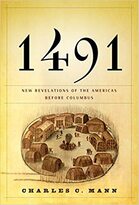
1491: New Revelations of the Americas Before Columbus
by Charles C. Mann A groundbreaking study that radically alters our understanding of the Americas before the arrival of the Europeans in 1492. Traditionally, Americans learned in school that the ancestors of the people who inhabited the Western Hemisphere at the time of Columbus’s landing had crossed the Bering Strait twelve thousand years ago; existed mainly in small, nomadic bands; and lived so lightly on the land that the Americas was, for all practical purposes, still a vast wilderness. But as Charles C. Mann now makes clear, archaeologists and anthropologists have spent the last thirty years proving these and many other long-held assumptions wrong. In a book that startles and persuades, Mann reveals how a new generation of researchers equipped with novel scientific techniques came to previously unheard-of conclusions. Among them:
|
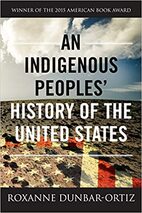
An Indigenous Peoples' History of the United States
by Roxanne Dunbar-Ortiz 2015 Recipient of the American Book Award The first history of the United States told from the perspective of indigenous peoples Today in the United States, there are more than five hundred federally recognized Indigenous nations comprising nearly three million people, descendants of the fifteen million Native people who once inhabited this land. The centuries-long genocidal program of the US settler-colonial regimen has largely been omitted from history. Now, for the first time, acclaimed historian and activist Roxanne Dunbar-Ortiz offers a history of the United States told from the perspective of Indigenous peoples and reveals how Native Americans, for centuries, actively resisted expansion of the US empire. In An Indigenous Peoples’ History of the United States, Dunbar-Ortiz adroitly challenges the founding myth of the United States and shows how policy against the Indigenous peoples was colonialist and designed to seize the territories of the original inhabitants, displacing or eliminating them. And as Dunbar-Ortiz reveals, this policy was praised in popular culture, through writers like James Fenimore Cooper and Walt Whitman, and in the highest offices of government and the military. Shockingly, as the genocidal policy reached its zenith under President Andrew Jackson, its ruthlessness was best articulated by US Army general Thomas S. Jesup, who, in 1836, wrote of the Seminoles: “The country can be rid of them only by exterminating them.” Spanning more than four hundred years, this classic bottom-up peoples’ history radically reframes US history and explodes the silences that have haunted our national narrative. |
1492: Exploration & Colonization
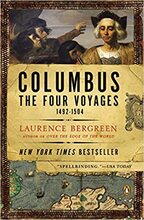
Columbus: The Four Voyages, 1492-1504
by Laurence Bergreen He knew nothing of celestial navigation or of the existence of the Pacific Ocean. He was a self-promoting and ambitious entrepreneur. His maps were a hybrid of fantasy and delusion. When he did make land, he enslaved the populace he found, encouraged genocide, and polluted relations between peoples. He ended his career in near lunacy. But Columbus had one asset that made all the difference, an inborn sense of the sea, of wind and weather, and of selecting the optimal course to get from A to B. Laurence Bergreen's energetic and bracing book gives the whole Columbus and most importantly, the whole of his career, not just the highlight of 1492. Columbus undertook three more voyages between 1494 and 1504, each designed to demonstrate that he could sail to China within a matter of weeks and convert those he found there to Christianity. By their conclusion, Columbus was broken in body and spirit, a hero undone by the tragic flaw of pride. If the first voyage illustrates the rewards of exploration, this book shows how the subsequent voyages illustrate the costs - political, moral, and economic. 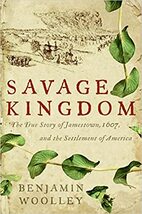
Savage Kingdom: The True Story of Jamestown, 1607, and the Settlement of America
by Mr. Benjamin Woolley Four centuries ago, and fourteen years before the Mayflower, a group of men—led by a one-armed ex-pirate, an epileptic aristocrat, a reprobate cleric and a government spy—left London aboard a fleet of three ships to start a new life in America. They arrived in Virginia in the spring of 1607 and set about trying to create a settlement on a tiny island in the James River. Despite their shortcomings, and against the odds, they built Jamestown, a ramshackle outpost that laid the foundations of the British Empire and the United States of America. Drawing on new discoveries, neglected sources and manuscript collections scattered across the world, Savage Kingdom challenges the textbook image of Jamestown as a mere money-making venture. It reveals a reckless, daring enterprise led by outcasts of the Old World who found themselves interlopers in a new one. It charts their journey into a beautiful landscape and a sophisticated culture that they found both ravishing and alien, which they yearned to possess but threatened to destroy. They called their new home a "savage kingdom," but it was the savagery they had experienced in Europe that had driven them across the ocean and which they hoped to escape by building in America "one of the most glorious nations under the sun." An intimate story in an epic setting, Woolley shows how the land of Pocahontas came to be drawn into a new global order, reaching from London to the Orinoco Delta, from the warring kingdoms of Angola to the slave markets of Mexico, from the gates of the Ottoman Empire to the foothills of the Blue Ridge Mountains. 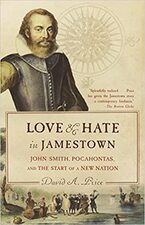
Love and Hate in Jamestown: John Smith, Pocahontas, and the Start of a New Nation
by David A. Price A New York Times Notable Book and aSan Jose Mercury News Top 20 Nonfiction Book of 2003 In 1606, approximately 105 British colonists sailed to America, seeking gold and a trade route to the Pacific. Instead, they found disease, hunger, and hostile natives. Ill prepared for such hardship, the men responded with incompetence and infighting; only the leadership of Captain John Smith averted doom for the first permanent English settlement in the New World.The Jamestown colony is one of the great survival stories of American history, and this book brings it fully to life for the first time. Drawing on extensive original documents, David A. Price paints intimate portraits of the major figures from the formidable monarch Chief Powhatan, to the resourceful but unpopular leader John Smith, to the spirited Pocahontas, who twice saved Smith’s life. He also gives a rare balanced view of relations between the settlers and the natives and debunks popular myths about the colony. This is a superb work of history, reminding us of the horrors and heroism that marked the dawning of our nation. |
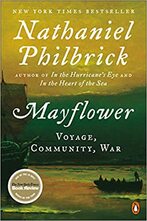
Mayflower: Voyage, Community, War
by Nathaniel Philbrick "Vivid and remarkably fresh...Philbrick has recast the Pilgrims for the ages."--The New York Times Book Review Finalist for the Pulitzer Prize in History New York Times Book Review Top Ten books of the Year With a new preface marking the 400th anniversary of the landing of the Mayflower. How did America begin? That simple question launches the acclaimed author of In the Hurricane's Eye and Valiant Ambition on an extraordinary journey to understand the truth behind our most sacred national myth: the voyage of the Mayflower and the settlement of Plymouth Colony. As Philbrick reveals in this electrifying history of the Pilgrims, the story of Plymouth Colony was a fifty-five year epic that began in peril and ended in war. New England erupted into a bloody conflict that nearly wiped out the English colonists and natives alike. These events shaped the existing communities and the country that would grow from them. 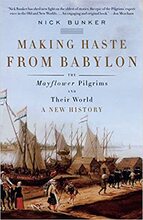
Making Haste from Babylon: The Mayflower Pilgrims and Their World: A New History
by Nick Bunker At the end of 1618, a blazing green star soared across the night sky over the northern hemisphere. From the Philippines to the Arctic, the comet became a sensation and a symbol, a warning of doom or a promise of salvation. Two years later, as the Pilgrims prepared to sail across the Atlantic on board the Mayflower, the atmosphere remained charged with fear and expectation. Men and women readied themselves for war, pestilence, or divine retribution. Against this background, and amid deep economic depression, the Pilgrims conceived their enterprise of exile. Within a decade, despite crisis and catastrophe, they built a thriving settlement at New Plymouth, based on beaver fur, corn, and cattle. In doing so, they laid the foundations for Massachusetts, New England, and a new nation. Using a wealth of new evidence from landscape, archaeology, and hundreds of overlooked or neglected documents, Nick Bunker gives a vivid and strikingly original account of the Mayflower project and the first decade of the Plymouth Colony. From mercantile London and the rural England of Queen Elizabeth I and King James I to the mountains and rivers of Maine, he weaves a rich narrative that combines religion, politics, money, science, and the sea. The Pilgrims were entrepreneurs as well as evangelicals, political radicals as well as Christian idealists. Making Haste from Babylon tells their story in unrivaled depth, from their roots in religious conflict and village strife at home to their final creation of a permanent foothold in America. 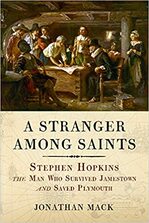
A Stranger Among Saints: Stephen Hopkins, the Man Who Survived Jamestown and Saved Plymouth
by Jonathan Mack In 1609, on a voyage to resupply England’s troubled Jamestown colony, the Sea Venture was caught in a hurricane and shipwrecked off the coast of Bermuda. The tale of its marooned survivors eventually inspired William Shakespeare’s The Tempest, but for one castaway it was only the beginning. A Stranger Among Saints traces the life of Stephen Hopkins, who spent ten months stranded with the Sea Venture crew, during which he was charged with attempted mutiny and condemned to die—only to have his sentence commuted just before it was carried out. Hopkins eventually made it to Jamestown, where he spent six years before returning to England and signing on to another colonial venture, this time with a group of religious radicals on the Mayflower. Hopkins was the only member of the party who had been across the Atlantic before—the only one who’d encountered America’s native people and land. The Pilgrims, plagued by disease and contentious early encounters with indigenous Americans, turned to him for leadership. Hopkins played a vital role in bridging the divide of suspicion between the English immigrants and their native neighbors. Without him, these settlers would likely not have lasted through that brutal first year. |
1763-1789: Revolutionary Era
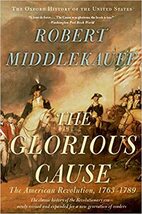
The Glorious Cause: The American Revolution, 1763-1789 (Oxford History of the United States)
by Robert Middlekauff The first book to appear in the illustrious Oxford History of the United States, this critically acclaimed volume a finalist for the Pulitzer Prize offers an unsurpassed history of the Revolutionary War and the birth of the American republic. Beginning with the French and Indian War and continuing to the election of George Washington as first president, Robert Middlekauff offers a panoramic history of the conflict between England and America, highlighting the drama and anguish of the colonial struggle for independence. Combining the political and the personal, he provides a compelling account of the key events that precipitated the war, from the Stamp Act to the Tea Act, tracing the gradual gathering of American resistance that culminated in the Boston Tea Party and "the shot heard 'round the world." The heart of the book features a vivid description of the eight year long war, with gripping accounts of battles and campaigns, ranging from Bunker Hill and Washington's crossing of the Delaware to the brilliant victory at Hannah's Cowpens and the final triumph at Yorktown, paying particular attention to what made men fight in these bloody encounters. The book concludes with an insightful look at the making of the Constitution in the Philadelphia Convention of 1787 and the struggle over ratification. Through it all, Middlekauff gives the reader a vivid sense of how the colonists saw these events and the importance they gave to them. Common soldiers and great generals, Sons of Liberty and African slaves, town committee men and representatives in congress all receive their due. And there are particularly insightful portraits of such figures as Sam and John Adams, James Otis, Thomas Jefferson, George Washington, and many others. 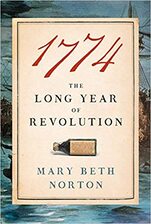
1774: The Long Year of Revolution
by Mary Beth Norton Mary Beth Norton keenly focuses on the sixteen months during which the traditional loyalists to King George III began their discordant "discussions" that led to their acceptance of the inevitability of war against the British Empire and to the clashes at Lexington and Concord in mid-April 1775. Drawing extensively on pamphlets, newspapers, and personal correspondence, Norton reconstructs colonial political discourse as it happened, showing the vigorous campaign mounted by conservatives criticizing congressional actions. But by then it was too late. In early 1775, governors throughout the colonies informed colonial officials in London that they were unable to thwart the increasing power of the committees and their allied provincial congresses. Although the Declaration of Independence would not be formally adopted until July 1776, Americans, even before the outbreak of war in April 1775, had in effect "declared independence" by obeying the decrees of their new provincial governments rather than colonial officials. 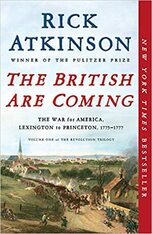
The British Are Coming: The War for America, Lexington to Princeton, 1775-1777 (The Revolution Trilogy, 1)
by Rick Atkinson Rick Atkinson, author of the Pulitzer Prize–winning An Army at Dawn and two other superb books about World War II, has long been admired for his deeply researched, stunningly vivid narrative histories. Now he turns his attention to a new war, and in the initial volume of the Revolution Trilogy he recounts the first twenty-one months of America’s violent war for independence. From the battles at Lexington and Concord in spring 1775 to those at Trenton and Princeton in winter 1777, American militiamen and then the ragged Continental Army take on the world’s most formidable fighting force. It is a gripping saga alive with astonishing characters: Henry Knox, the former bookseller with an uncanny understanding of artillery; Nathanael Greene, the blue-eyed bumpkin who becomes a brilliant battle captain; Benjamin Franklin, the self-made man who proves to be the wiliest of diplomats; George Washington, the commander in chief who learns the difficult art of leadership when the war seems all but lost. The story is also told from the British perspective, making the mortal conflict between the redcoats and the rebels all the more compelling. Full of riveting details and untold stories, The British Are Coming is a tale of heroes and knaves, of sacrifice and blunder, of redemption and profound suffering. Rick Atkinson has given stirring new life to the first act of our country’s creation drama. |
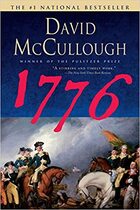
1776
by David McCullough America’s beloved and distinguished historian presents, in a book of breathtaking excitement, drama, and narrative force, the stirring story of the year of our nation’s birth, 1776, interweaving, on both sides of the Atlantic, the actions and decisions that led Great Britain to undertake a war against her rebellious colonial subjects and that placed America’s survival in the hands of George Washington. In this masterful book, David McCullough tells the intensely human story of those who marched with General George Washington in the year of the Declaration of Independence—when the whole American cause was riding on their success, without which all hope for independence would have been dashed and the noble ideals of the Declaration would have amounted to little more than words on paper. Based on extensive research in both American and British archives, 1776 is a powerful drama written with extraordinary narrative vitality. It is the story of Americans in the ranks, men of every shape, size, and color, farmers, schoolteachers, shoemakers, no-accounts, and mere boys turned soldiers. And it is the story of the King’s men, the British commander, William Howe, and his highly disciplined redcoats who looked on their rebel foes with contempt and fought with a valor too little known. Written as a companion work to his celebrated biography of John Adams, David McCullough’s 1776 is another landmark in the literature of American history. 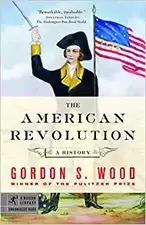
The American Revolution: A History (Modern Library Chronicles)
by Gordon S. Wood A magnificent account of the revolution in arms and consciousness that gave birth to the American republic. When Abraham Lincoln sought to define the significance of the United States, he naturally looked back to the American Revolution. He knew that the Revolution not only had legally created the United States, but also had produced all of the great hopes and values of the American people. Our noblest ideals and aspirations-our commitments to freedom, constitutionalism, the well-being of ordinary people, and equality-came out of the Revolutionary era. Lincoln saw as well that the Revolution had convinced Americans that they were a special people with a special destiny to lead the world toward liberty. The Revolution, in short, gave birth to whatever sense of nationhood and national purpose Americans have had. No doubt the story is a dramatic one: Thirteen insignificant colonies three thousand miles from the centers of Western civilization fought off British rule to become, in fewer than three decades, a huge, sprawling, rambunctious republic of nearly four million citizens. But the history of the American Revolution, like the history of the nation as a whole, ought not to be viewed simply as a story of right and wrong from which moral lessons are to be drawn. It is a complicated and at times ironic story that needs to be explained and understood, not blindly celebrated or condemned. How did this great revolution come about? What was its character? What were its consequences? These are the questions this short history seeks to answer. That it succeeds in such a profound and enthralling way is a tribute to Gordon Wood’s mastery of his subject, and of the historian’s craft. 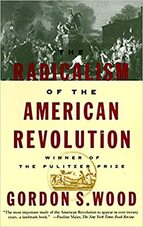
The Radicalism of the American Revolution
by Gordon S. Wood In a grand and immensely readable synthesis of historical, political, cultural, and economic analysis, a prize-winning historian describes the events that made the American Revolution. Gordon S. Wood depicts a revolution that was about much more than a break from England, rather it transformed an almost feudal society into a democratic one, whose emerging realities sometimes baffled and disappointed its founding fathers. 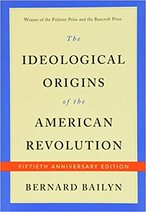
The Ideological Origins of the American Revolution
by Bernard Bailyn The Ideological Origins of the American Revolution, awarded both the Pulitzer and the Bancroft prizes, has become a classic of American historical literature. Hailed at its first appearance as “the most brilliant study of the meaning of the Revolution to appear in a generation,” it was enlarged in a second edition to include the nationwide debate on the ratification of the Constitution, hence exploring not only the Founders’ initial hopes and aspirations but also their struggle to implement their ideas in constructing the national government. Now, in a new preface, Bernard Bailyn reconsiders salient features of the book and isolates the Founders’ profound concern with power. In pamphlets, letters, newspapers, and sermons they returned again and again to the problem of the uses and misuses of power―the great benefits of power when gained and used by popular consent and the political and social devastation when acquired by those who seize it by force or other means and use it for their personal benefit. |
Founding Figures
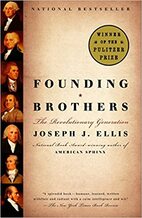
Founding Brothers: The Revolutionary Generation
by Joseph J. Ellis In this landmark work of history, the National Book Award—winning author of American Sphinx explores how a group of greatly gifted but deeply flawed individuals–Hamilton, Burr, Jefferson, Franklin, Washington, Adams, and Madison–confronted the overwhelming challenges before them to set the course for our nation. The United States was more a fragile hope than a reality in 1790. During the decade that followed, the Founding Fathers–re-examined here as Founding Brothers–combined the ideals of the Declaration of Independence with the content of the Constitution to create the practical workings of our government. Through an analysis of six fascinating episodes–Hamilton and Burr’s deadly duel, Washington’s precedent-setting Farewell Address, Adams’ administration and political partnership with his wife, the debate about where to place the capital, Franklin’s attempt to force Congress to confront the issue of slavery and Madison’s attempts to block him, and Jefferson and Adams’ famous correspondence–Founding Brothers brings to life the vital issues and personalities from the most important decade in our nation’s history. 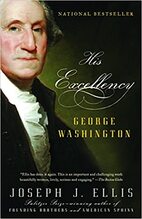
His Excellency: George Washington
by Joseph J. Ellis To this landmark biography of our first president, Joseph J. Ellis brings the exacting scholarship, shrewd analysis, and lyric prose that have made him one of the premier historians of the Revolutionary era. Training his lens on a figure who sometimes seems as remote as his effigy on Mount Rushmore, Ellis assesses George Washington as a military and political leader and a man whose “statue-like solidity” concealed volcanic energies and emotions. Here is the impetuous young officer whose miraculous survival in combat half-convinced him that he could not be killed. Here is the free-spending landowner whose debts to English merchants instilled him with a prickly resentment of imperial power. We see the general who lost more battles than he won and the reluctant president who tried to float above the partisan feuding of his cabinet. His Excellency is a magnificent work, indispensable to an understanding not only of its subject but also of the nation he brought into being. 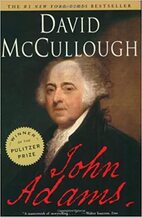
John Adams
by David McCullough The Pulitzer Prize–winning, bestselling biography of America’s founding father and second president that was the basis for the acclaimed HBO series, brilliantly told by master historian David McCullough. In this powerful, epic biography, David McCullough unfolds the adventurous life journey of John Adams, the brilliant, fiercely independent, often irascible, always honest Yankee patriot who spared nothing in his zeal for the American Revolution; who rose to become the second president of the United States and saved the country from blundering into an unnecessary war; who was learned beyond all but a few and regarded by some as “out of his senses”; and whose marriage to the wise and valiant Abigail Adams is one of the moving love stories in American history. This is history on a grand scale—a book about politics and war and social issues, but also about human nature, love, religious faith, virtue, ambition, friendship, and betrayal, and the far-reaching consequences of noble ideas. Above all, John Adams is an enthralling, often surprising story of one of the most important and fascinating Americans who ever lived. 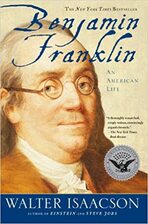
Benjamin Franklin: An American Life
by Walter Isaacson Benjamin Franklin is the founding father who winks at us, the one who seems made of flesh rather than marble. In a sweeping narrative that follows Franklin’s life from Boston to Philadelphia to London and Paris and back, Walter Isaacson chronicles the adventures of the runaway apprentice who became, over the course of his eighty-four-year life, America’s best writer, inventor, media baron, scientist, diplomat, and business strategist, as well as one of its most practical and ingenious political leaders. He explores the wit behind Poor Richard’s Almanac and the wisdom behind the Declaration of Independence, the new nation’s alliance with France, the treaty that ended the Revolution, and the compromises that created a near-perfect Constitution. In this colorful and intimate narrative, Isaacson provides the full sweep of Franklin’s amazing life, showing how he helped to forge the American national identity and why he has a particular resonance in the twenty-first century. 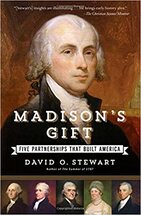
Madison's Gift: Five Partnerships That Built America
by David O. Stewart Short, plain, balding, neither soldier nor orator, low on charisma and high on intelligence, James Madison cared more about achieving results than taking the credit. Forming key partnerships with Washington, Jefferson, Monroe, and his wife Dolley, Madison achieved his lifelong goal of a self-governing constitutional republic. It was Madison who led the drive for the Constitutional Convention and pressed for an effective new government as his patron George Washington lent the effort legitimacy; Madison who wrote the Federalist Papers with Alexander Hamilton to secure the Constitution’s ratification; Madison who joined Thomas Jefferson to found the nation’s first political party and move the nation toward broad democratic principles; Madison, with James Monroe, who guided the new nation through its first war in 1812, and who handed the reins of government to the last of the Founders. But it was his final partnership that allowed Madison to escape his natural shyness and reach the greatest heights. Dolley was the woman he married in middle age and who presided over both him and an enlivened White House. This partnership was a love story, a unique one that sustained Madison through his political rise, his presidency, and a fruitful retirement. In Madison’s Gift, David O. Stewart’s “insights are illuminating….He weaves vivid, sometimes poignant details throughout the grand sweep of historical events. He brings early history alive in a way that offers today’s readers perspective” (Christian Science Monitor). 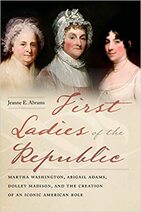
First Ladies of the Republic: Martha Washington, Abigail Adams, Dolley Madison, and the Creation of an Iconic American Role
by Jeanne E. Abrams How the three inaugural First Ladies defined the role for future generations, and carved a space for women in America America’s first First Ladies―Martha Washington, Abigail Adams, and Dolley Madison―had the challenging task of playing a pivotal role in defining the nature of the American presidency to a fledgling nation and to the world. In First Ladies of the Republic, Jeanne Abrams breaks new ground by examining their lives as a group. From their visions for the future of the burgeoning new nation and its political structure, to ideas about family life and matrimony, these three women had a profound influence on one another’s views as they created the new role of presidential spouse. Martha, Abigail and Dolley walked the fine line between bringing dignity to their lives as presidential wives, and supporting their husbands’ presidential agendas, while at the same time, distancing themselves from the behavior, customs and ceremonies that reflected the courtly styles of European royalty that were inimical to the values of the new republic. In the face of personal challenges, public scrutiny, and sometimes vocal criticism, they worked to project a persona that inspired approval and confidence, and helped burnish their husbands’ presidential reputations. The position of First Lady was not officially authorized or defined, and the place of women in society was more restricted than it is today. These capable and path-breaking women not only shaped their own roles as prominent Americans and “First Ladies,” but also defined a role for women in public and private life in America. 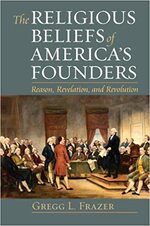
The Religious Beliefs of America's Founders: Reason, Revelation, and Revolution
by Gregg L. Frazer Were America's Founders Christians or deists? Conservatives and secularists have taken each position respectively, mustering evidence to insist just how tall the wall separating church and state should be. Now Gregg Frazer puts their arguments to rest in the first comprehensive analysis of the Founders' beliefs as they themselves expressed them—showing that today's political right and left are both wrong. Going beyond church attendance or public pronouncements made for political ends, Frazer scrutinizes the Founders' candid declarations regarding religion found in their private writings. Distilling decades of research, he contends that these men were neither Christian nor deist but rather adherents of a system he labels "theistic rationalism," a hybrid belief system that combined elements of natural religion, Protestantism, and reason—with reason the decisive element. Frazer explains how this theological middle ground developed, what its core beliefs were, and how they were reflected in the thought of eight Founders: John Adams, Thomas Jefferson, Benjamin Franklin, James Wilson, Gouverneur Morris, James Madison, Alexander Hamilton, and George Washington. He argues convincingly that Congregationalist Adams is the clearest example of theistic rationalism; that presumed deists Jefferson and Franklin are less secular than supposed; and that even the famously taciturn Washington adheres to this theology. He also shows that the Founders held genuinely religious beliefs that aligned with morality, republican government, natural rights, science, and progress. Frazer's careful explication helps readers better understand the case for revolutionary recruitment, the religious references in the Declaration of Independence, and the religious elements-and lack thereof-in the Constitution. He also reveals how influential clergymen, backing their theology of theistic rationalism with reinterpreted Scripture, preached and published liberal democratic theory to justify rebellion. Deftly blending history, religion, and political thought, Frazer succeeds in showing that the American experiment was neither a wholly secular venture nor an attempt to create a Christian nation founded on biblical principles. By showcasing the actual approach taken by these key Founders, he suggests a viable solution to the twenty-first-century standoff over the relationship between church and state—and challenges partisans on both sides to articulate their visions for America on their own merits without holding the Founders hostage to positions they never held. |
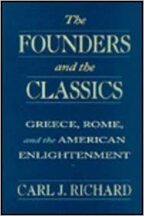
The Founders and the Classics: Greece, Rome, and the American Enlightenment
by Carl J. Richard Is our Greek and Roman heritage merely allusive and illusory? Or were our founders, and so our republican beginnings, truly steeped in the stuff of antiquity? So far largely a matter of generalization and speculation, the influence of Greek and Roman authors on our American forefathers finally becomes clear in this fascinating book-the first comprehensive study of the founders’ classical reading. Carl J. Richard begins by examining how eighteenth-century social institutions in general and the educational system in particular conditioned the founders to venerate the classics. He then explores the founders’ various uses of classical symbolism, models, “antimodels,” mixed government theory, pastoralism, and philosophy, revealing in detail the formative influence exerted by the classics, both directly and through the mediation of Whig and American perspectives. In this analysis, we see how the classics not only supplied the principal basis for the U.S. Constitution but also contributed to the founders’ conception of human nature, their understanding of virtue, and their sense of identity and purpose within a grand universal scheme. At the same time, we learn how the classics inspired obsessive fear of conspiracies against liberty, which poisoned relations between Federalists and Republicans. The shrewd ancients who molded Western civilization still have much to teach us, Richard suggests. His account of the critical role they played in shaping our nation and our lives provides a valuable lesson in the transcendent power of the classics. 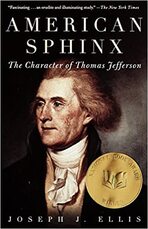
American Sphinx: The Character of Thomas Jefferson
by Joseph J. Ellis For a man who insisted that life on the public stage was not what he had in mind, Thomas Jefferson certainly spent a great deal of time in the spotlight--and not only during his active political career. After 1809, his longed-for retirement was compromised by a steady stream of guests and tourists who made of his estate at Monticello a virtual hotel, as well as by more than one thousand letters per year, most from strangers, which he insisted on answering personally. In his twilight years Jefferson was already taking on the luster of a national icon, which was polished off by his auspicious death (on July 4, 1826); and in the subsequent seventeen decades of his celebrity--now verging, thanks to virulent revisionists and television documentaries, on notoriety--has been inflated beyond recognition of the original person. For the historian Joseph J. Ellis, the experience of writing about Jefferson was "as if a pathologist, just about to begin an autopsy, has discovered that the body on the operating table was still breathing." In American Sphinx, Ellis sifts the facts shrewdly from the legends and the rumors, treading a path between vilification and hero worship in order to formulate a plausible portrait of the man who still today "hover[s] over the political scene like one of those dirigibles cruising above a crowded football stadium, flashing words of inspiration to both teams." For, at the grass roots, Jefferson is no longer liberal or conservative, agrarian or industrialist, pro- or anti-slavery, privileged or populist. He is all things to all people. His own obliviousness to incompatible convictions within himself (which left him deaf to most forms of irony) has leaked out into the world at large--a world determined to idolize him despite his foibles. From Ellis we learn that Jefferson sang incessantly under his breath; that he delivered only two public speeches in eight years as president, while spending ten hours a day at his writing desk; that sometimes his political sensibilities collided with his domestic agenda, as when he ordered an expensive piano from London during a boycott (and pledged to "keep it in storage"). We see him relishing such projects as the nailery at Monticello that allowed him to interact with his slaves more palatably, as pseudo-employer to pseudo-employees. We grow convinced that he preferred to meet his lovers in the rarefied region of his mind rather than in the actual bedchamber. We watch him exhibiting both great depth and great shallowness, combining massive learning with extraordinary naïveté, piercing insights with self-deception on the grandest scale. We understand why we should neither beatify him nor consign him to the rubbish heap of history, though we are by no means required to stop loving him. He is Thomas Jefferson, after all--our very own sphinx. 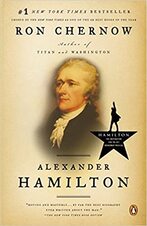
Alexander Hamilton
by Ron Chernow Few figures in American history have been more hotly debated or more grossly misunderstood than Alexander Hamilton. Chernow’s biography gives Hamilton his due and sets the record straight, deftly illustrating that the political and economic greatness of today’s America is the result of Hamilton’s countless sacrifices to champion ideas that were often wildly disputed during his time. “To repudiate his legacy,” Chernow writes, “is, in many ways, to repudiate the modern world.” Chernow here recounts Hamilton’s turbulent life: an illegitimate, largely self-taught orphan from the Caribbean, he came out of nowhere to take America by storm, rising to become George Washington’s aide-de-camp in the Continental Army, coauthoring The Federalist Papers, founding the Bank of New York, leading the Federalist Party, and becoming the first Treasury Secretary of the United States.Historians have long told the story of America’s birth as the triumph of Jefferson’s democratic ideals over the aristocratic intentions of Hamilton. Chernow presents an entirely different man, whose legendary ambitions were motivated not merely by self-interest but by passionate patriotism and a stubborn will to build the foundations of American prosperity and power. His is a Hamilton far more human than we’ve encountered before—from his shame about his birth to his fiery aspirations, from his intimate relationships with childhood friends to his titanic feuds with Jefferson, Madison, Adams, Monroe, and Burr, and from his highly public affair with Maria Reynolds to his loving marriage to his loyal wife Eliza. And never before has there been a more vivid account of Hamilton’s famous and mysterious death in a duel with Aaron Burr in July of 1804. Chernow’s biography is not just a portrait of Hamilton, but the story of America’s birth seen through its most central figure. At a critical time to look back to our roots, Alexander Hamilton will remind readers of the purpose of our institutions and our heritage as Americans. 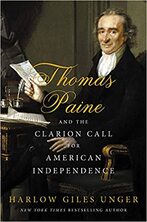
Thomas Paine and the Clarion Call for American Independence
by Harlow Giles Unger From New York Times bestselling author and Founding Fathers' biographer Harlow Giles Unger comes the astonishing biography of the man whose pen set America ablaze, inspiring its revolution, and whose ideas about reason and religion continue to try men's souls. Thomas Paine's words were like no others in history: they leaped off the page, inspiring readers to change their lives, their governments, their kings, and even their gods. In an age when spoken and written words were the only forms of communication, Paine's aroused men to action like no one else. The most widely read political writer of his generation, he proved to be more than a century ahead of his time, conceiving and demanding unheard-of social reforms that are now integral elements of modern republican societies. Among them were government subsidies for the poor, universal housing and education, pre- and post-natal care for women, and universal social security. An Englishman who emigrated to the American colonies, he formed close friendships with Benjamin Franklin, Thomas Jefferson, and James Madison, and his ideas helped shape the Declaration of Independence and the Bill of Rights. However, the world turned against Paine in his later years. While his earlier works, Common Sense and Rights of Man, attacked the political and social status quo here on earth, The Age of Reason attacked the status quo of the hereafter. Former friends shunned him, and the man America had hailed as the muse of the American Revolution died alone and forgotten. Packed with action and intrigue, soldiers and spies, politics and perfidy, Unger's Thomas Paine is a much-needed new look at a defining figure. 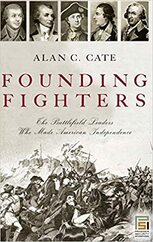
Founding Fighters: The Battlefield Leaders Who Made American Independence
by Alan C. Cate American independence was won not just with ideas and words, but also through force of arms. A key element of that battlefield victory was the combat leadership provided by a fierce list of hard-fighting warriors at the regimental, brigade, and division echelons or their naval equivalents. Founding Fighters recounts the stories of fifteen of the American Revolution's most important and colorful battlefield commanders. Collectively, these men participated in virtually all of the war's significant battles and campaigns. They experienced the conflict in all its variants: conventional contest between opposing armies, brutal guerilla struggle between partisans and regulars, frontier and naval fighting, and civil war pitting neighbors, and even family members against each other. These founding fighters helped win stunning victories, knew ignominious defeats, and suffered physical and spiritual privation through times when ultimate victory and independence appeared impossibly remote. While the Founding Fathers remain eternally popular with the general American reading public, a number of important Revolutionary-era military figures remain much less known (and, in some cases, forgotten). Cate rectifies this. Richard Montgomery, Charles Lee, and Horatio Gates were former British officers who turned from redcoats to rebels, casting their lots with the patriot cause. Henry Knox and Nathanael Greene were self-taught amateurs who shared New England roots and an innate genius for war. Benedict Arnold and John Paul Jones each possessed burning personal ambition and zeal for glory, traits that led one to ignominy and disgrace and the other to immortality as the father of the American Navy. A trio of South Carolinians―Thomas Sumter, Andrew Pickens, and Francis Marion―waged savage partisan warfare in some of the war's darkest days against British occupiers and their Loyalist supporters. Three rough and ready frontiersmen―Ethan Allen, George Rogers Clark, and Daniel Morgan―inspired their followers to important victories. More than a mere examination of battlefield exploits and personalities, however, this book illuminates fascinating aspects of American military and cultural history and offers a superb window for investigating two of the enduring themes of the American military tradition, civil-military relations and the respective roles and worth of professional and citizen soldiers. |
1789–1812: Westward Expansion
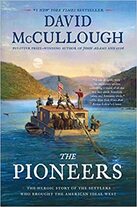
The Pioneers: The Heroic Story of the Settlers Who Brought the American Ideal West
by David McCullough As part of the Treaty of Paris, in which Great Britain recognized the new United States of America, Britain ceded the land that comprised the immense Northwest Territory, a wilderness empire northwest of the Ohio River containing the future states of Ohio, Indiana, Illinois, Michigan, and Wisconsin. A Massachusetts minister named Manasseh Cutler was instrumental in opening this vast territory to veterans of the Revolutionary War and their families for settlement. Included in the Northwest Ordinance were three remarkable conditions: freedom of religion, free universal education, and most importantly, the prohibition of slavery. In 1788 the first band of pioneers set out from New England for the Northwest Territory under the leadership of Revolutionary War veteran General Rufus Putnam. They settled in what is now Marietta on the banks of the Ohio River. McCullough tells the story through five major characters: Cutler and Putnam; Cutler’s son Ephraim; and two other men, one a carpenter turned architect, and the other a physician who became a prominent pioneer in American science. “With clarity and incisiveness, [McCullough] details the experience of a brave and broad-minded band of people who crossed raging rivers, chopped down forests, plowed miles of land, suffered incalculable hardships, and braved a lonely frontier to forge a new American ideal” (The Providence Journal). Drawn in great part from a rare and all-but-unknown collection of diaries and letters by the key figures, The Pioneers is a uniquely American story of people whose ambition and courage led them to remarkable accomplishments. “A tale of uplift” (The New York Times Book Review), this is a quintessentially American story, written with David McCullough’s signature narrative energy. 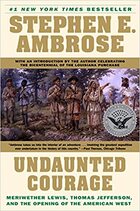
Undaunted Courage: Meriwether Lewis, Thomas Jefferson, and the Opening of the American West
by Stephen Ambrose From the New York Times bestselling author of Band of Brothers and D-Day, the definitive book on Lewis and Clark’s exploration of the Louisiana Purchase, the most momentous expedition in American history and one of the great adventure stories of all time. In 1803 President Thomas Jefferson selected his personal secretary, Captain Meriwether Lewis, to lead a voyage up the Missouri River to the Rockies, over the mountains, down the Columbia River to the Pacific Ocean, and back. Lewis and his partner, Captain William Clark, made the first map of the trans-Mississippi West, provided invaluable scientific data on the flora and fauna of the Louisiana Purchase territory, and established the American claim to Oregon, Washington, and Idaho. Ambrose has pieced together previously unknown information about weather, terrain, and medical knowledge at the time to provide a vivid backdrop for the expedition. Lewis is supported by a rich variety of colorful characters, first of all Jefferson himself, whose interest in exploring and acquiring the American West went back thirty years. Next comes Clark, a rugged frontiersman whose love for Lewis matched Jefferson’s. There are numerous Indian chiefs, and Sacagawea, the Indian girl who accompanied the expedition, along with the French-Indian hunter Drouillard, the great naturalists of Philadelphia, the French and Spanish fur traders of St. Louis, John Quincy Adams, and many more leading political, scientific, and military figures of the turn of the century. High adventure, high politics, suspense, drama, and diplomacy combine with high romance and personal tragedy to make this outstanding work of scholarship as readable as a novel. 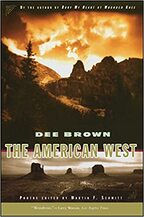
The American West
by Dee Brown Renowned storyteller Dee Brown, author of the bestselling Bury My Heart at Wounded Knee, recreates the struggles of Native Americans, settlers, and ranchers in this stunning volume that illuminates the history of the old West that’s filled with maps and vintage photographs. Beginning with the demise of the Native Americans of the Plains, Brown depicts the onrush of the burgeoning cattle trade and the waves of immigrants who ultimately “settled” the land. In the retelling of this oft-told saga, Brown has demonstrated once again his abilities as a master storyteller and an entertaining popular historian. By turns heroic, tragic, and even humorous, The American West brings to life American tragedy and triumph in the years from 1840 to the turn of the century, and a roster of characters both great and small: Red Cloud, Sitting Bull, Geronimo, Dull Knife, Crazy Horse, Captain Jack, John H. Tunstall, Billy the Kid, Pat Garrett, Wyatt Earp, the Hole-in-the-Wall Gang, Wild Bill Hickok, Charles Goodnight, Oliver Loving, Buffalo Bill, and many others. The American West is about cattle and the railroads; it is about settlers who came to claim a land not originally their own and how they slowly imposed law and order on these wild and untamed places; and it is about the wanton destruction of the Native American way of life. This is epic history at its best and popular history at its most readable. This new work is culled from Dee Brown’s highly acclaimed writings, which instantly established him as one of America’s foremost Western authorities. Fully revised, rewritten, and edited into one seamless account of America’s most famous frontier, this epic narrative, along with the introduction and a chronological table of events, etches an unforgettable and poignant portrait. The American West is at once a tribute to the West and a majestic new peak for a writer whose long and successful career has been synonymous with excellence in frontier history. |
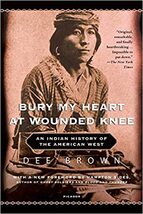
Bury My Heart at Wounded Knee: An Indian History of the American West
by Dee Brown Hampton Sides (Foreword) The landmark, bestselling account of the crimes against American Indians during the 19th century, now on its 50th Anniversary. First published in 1970, Bury My Heart at Wounded Knee is Dee Brown's eloquent, meticulously documented account of the systematic destruction of American Indians during the second half of the nineteenth century. A national bestseller in hardcover for more than a year after its initial publication, it has sold almost four million copies and has been translated into seventeen languages. Using council records, autobiographies, and firsthand descriptions, Brown introduces readers to great chiefs and warrors of the Dakota, Ute, Sioux, Cheyenne, and other tribes, revealing in heartwrenching detail the battles, massacres, and broken treaties that methodically stripped them of freedom. A forceful narrative still discussed today as revelatory and controversial, Bury My Heart at Wounded Knee permanently altered our understanding of how the American West came to be defined. 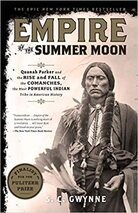
Empire of the Summer Moon: Quanah Parker and the Rise and Fall of the Comanches, the Most Powerful Indian Tribe in American History
by S. C. Gwynne In the tradition of Bury My Heart at Wounded Knee, a stunningly vivid historical account of the forty-year battle between Comanche Indians and white settlers for control of the American West, centering on Quanah, the greatest Comanche chief of them all.S. C. Gwynne’s Empire of the Summer Moon spans two astonishing stories. The first traces the rise and fall of the Comanches, the most powerful Indian tribe in American history. The second entails one of the most remarkable narratives ever to come out of the Old West: the epic saga of the pioneer woman Cynthia Ann Parker and her mixed-blood son Quanah, who became the last and greatest chief of the Comanches. Although readers may be more familiar with the tribal names Apache and Sioux, it was in fact the legendary fighting ability of the Comanches that determined just how and when the American West opened up. Comanche boys became adept bareback riders by age six; full Comanche braves were considered the best horsemen who ever rode. They were so masterful at war and so skillful with their arrows and lances that they stopped the northern drive of colonial Spain from Mexico and halted the French expansion westward from Louisiana. White settlers arriving in Texas from the eastern United States were surprised to find the frontier being rolled backward by Comanches incensed by the invasion of their tribal lands. So effective were the Comanches that they forced the creation of the Texas Rangers and account for the advent of the new weapon specifically designed to fight them: the six-gun. The war with the Comanches lasted four decades, in effect holding up the development of the new American nation. Gwynne’s exhilarating account delivers a sweeping narrative that encompasses Spanish colonialism, the Civil War, the destruction of the buffalo herds, and the arrival of the railroads—a historical feast for anyone interested in how the United States came into being. Against this backdrop Gwynne presents the compelling drama of Cynthia Ann Parker, a lovely nine-year-old girl with cornflower-blue eyes who was kidnapped by Comanches from the far Texas frontier in 1836. She grew to love her captors and became infamous as the "White Squaw" who refused to return until her tragic capture by Texas Rangers in 1860. More famous still was her son Quanah, a warrior who was never defeated and whose guerrilla wars in the Texas Panhandle made him a legend. S. C. Gwynne’s account of these events is meticulously researched, intellectually provocative, and, above all, thrillingly told. Empire of the Summer Moon announces him as a major new writer of American history. 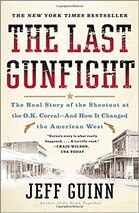
The Last Gunfight: The Real Story of the Shootout at the O.K. Corral-And How It Changed the American West
by Jeff Guinn A New York Times bestseller, Jeff Guinn’s definitive, myth-busting account of the most famous gunfight in American history reveals who Wyatt Earp, Doc Holliday, and the Clantons and McLaurys really were and what the shootout was all about—“the most thorough account of the gunfight and its circumstances ever published” (The Wall Street Journal) On the afternoon of October 26, 1881, in a vacant lot in Tombstone, Arizona, a confrontation between eight armed men erupted in a deadly shootout. The Gunfight at the O.K. Corral would shape how future generations came to view the Old West. Wyatt Earp, Doc Holliday, and the Clantons became the stuff of legends, symbolic of a frontier populated by good guys in white hats and villains in black ones. It’s a colorful story—but the truth is even better. Drawing on new material from private collections—including diaries, letters, and Wyatt Earp’s own hand-drawn sketch of the shootout’s conclusion—as well as archival research, Jeff Guinn gives us a startlingly different and far more fascinating picture of what actually happened that day in Tombstone and why. |
1812–1846: Antebellum Era
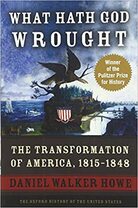
What Hath God Wrought: The Transformation of America, 1815-1848 (Oxford History of the United States)
by Daniel Walker Howe A panoramic narrative, What Hath God Wrought portrays revolutionary improvements in transportation and communications that accelerated the extension of the American empire. Railroads, canals, newspapers, and the telegraph dramatically lowered travel times and spurred the spread of information. These innovations prompted the emergence of mass political parties and stimulated America's economic development from an overwhelmingly rural country to a diversified economy in which commerce and industry took their place alongside agriculture. In his story, the author weaves together political and military events with social, economic, and cultural history. Howe examines the rise of Andrew Jackson and his Democratic party, but contends that John Quincy Adams and other Whigs--advocates of public education and economic integration, defenders of the rights of Indians, women, and African-Americans--were the true prophets of America's future. In addition, Howe reveals the power of religion to shape many aspects of American life during this period, including slavery and antislavery, women's rights and other reform movements, politics, education, and literature. Howe's story of American expansion culminates in the bitterly controversial but brilliantly executed war waged against Mexico to gain California and Texas for the United States. |
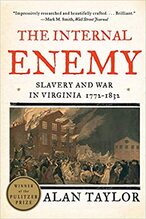
The Internal Enemy: Slavery and War in Virginia, 1772-1832
by Alan Taylor Winner of the Pulitzer Prize for History Finalist for the National Book Award and the Los Angeles Times Book Prize "Impressively researched and beautifully crafted…a brilliant account of slavery in Virginia during and after the Revolution." ―Mark M. Smith, Wall Street Journal Frederick Douglass recalled that slaves living along Chesapeake Bay longingly viewed sailing ships as "freedom’s swift-winged angels." In 1813 those angels appeared in the bay as British warships coming to punish the Americans for declaring war on the empire. Over many nights, hundreds of slaves paddled out to the warships seeking protection for their families from the ravages of slavery. The runaways pressured the British admirals into becoming liberators. As guides, pilots, sailors, and marines, the former slaves used their intimate knowledge of the countryside to transform the war. They enabled the British to escalate their onshore attacks and to capture and burn Washington, D.C. Tidewater masters had long dreaded their slaves as "an internal enemy." By mobilizing that enemy, the war ignited the deepest fears of Chesapeake slaveholders. It also alienated Virginians from a national government that had neglected their defense. Instead they turned south, their interests aligning more and more with their section. In 1820 Thomas Jefferson observed of sectionalism: "Like a firebell in the night [it] awakened and filled me with terror. I considered it at once the knell of the union." The notes of alarm in Jefferson's comment speak of the fear aroused by the recent crisis over slavery in his home state. His vision of a cataclysm to come proved prescient. Jefferson's startling observation registered a turn in the nation’s course, a pivot from the national purpose of the founding toward the threat of disunion. Drawn from new sources, Alan Taylor's riveting narrative re-creates the events that inspired black Virginians, haunted slaveholders, and set the nation on a new and dangerous course. |
1836–1860: Division and Civil War
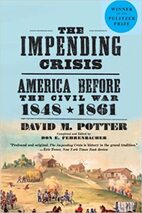
The Impending Crisis, 1848-1861
by David M. Potter David M. Potter's Pulitzer Prize-winning The Impending Crisis is the definitive history of antebellum America. Potter's sweeping epic masterfully charts the chaotic forces that climaxed with the outbreak of the Civil War: westward expansion, the divisive issue of slavery, the Dred Scott decision, John Brown's uprising, the ascension of Abraham Lincoln, and the drama of Southern secession. Now available in a new edition, The Impending Crisis remains one of the most celebrated works of American historical writing. 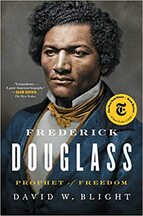
Frederick Douglass: Prophet of Freedom
by David W. Blight As a young man Frederick Douglass (1818–1895) escaped from slavery in Baltimore, Maryland. He was fortunate to have been taught to read by his slave owner mistress, and he would go on to become one of the major literary figures of his time. His very existence gave the lie to slave owners: with dignity and great intelligence he bore witness to the brutality of slavery. Initially mentored by William Lloyd Garrison, Douglass spoke widely, using his own story to condemn slavery. By the Civil War, Douglass had become the most famed and widely travelled orator in the nation. In his unique and eloquent voice, written and spoken, Douglass was a fierce critic of the United States as well as a radical patriot. After the war he sometimes argued politically with younger African Americans, but he never forsook either the Republican party or the cause of black civil and political rights. 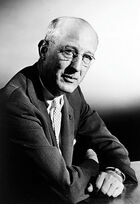
Charles Bruce Catton
(October 9, 1899 – August 28, 1978)
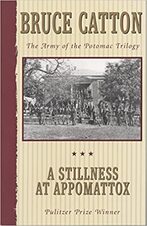
A Stillness at Appomattox (Army of the Potomac, Vol. 3)
by Bruce Catton Recounting the final year of the Civil War, this classic volume by Bruce Catton won both the Pulitzer Prize and the National Book Award for excellence in non-fiction. In this final volume of the Army of the Potomac Trilogy, Catton, America's foremost Civil War historian, takes the reader through the battles of the Wilderness, the Bloody Angle, Cold Harbot, the Crater, and on through the horrible months to one moment at Appomattox. Grant, Meade, Sheridan, and Lee vividly come to life in all their failings and triumphs. |
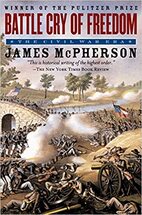
Battle Cry of Freedom: The Civil War Era
by James M. McPherson Filled with fresh interpretations and information, puncturing old myths and challenging new ones, Battle Cry of Freedom will unquestionably become the standard one-volume history of the Civil War. James McPherson's fast-paced narrative fully integrates the political, social, and military events that crowded the two decades from the outbreak of one war in Mexico to the ending of another at Appomattox. Packed with drama and analytical insight, the book vividly recounts the momentous episodes that preceded the Civil War--the Dred Scott decision, the Lincoln-Douglas debates, John Brown's raid on Harper's Ferry--and then moves into a masterful chronicle of the war itself--the battles, the strategic maneuvering on both sides, the politics, and the personalities. Particularly notable are McPherson's new views on such matters as the slavery expansion issue in the 1850s, the origins of the Republican Party, the causes of secession, internal dissent and anti-war opposition in the North and the South, and the reasons for the Union's victory. The book's title refers to the sentiments that informed both the Northern and Southern views of the conflict: the South seceded in the name of that freedom of self-determination and self-government for which their fathers had fought in 1776, while the North stood fast in defense of the Union founded by those fathers as the bulwark of American liberty. Eventually, the North had to grapple with the underlying cause of the war--slavery--and adopt a policy of emancipation as a second war aim. This "new birth of freedom," as Lincoln called it, constitutes the proudest legacy of America's bloodiest conflict. This authoritative volume makes sense of that vast and confusing "second American Revolution" we call the Civil War, a war that transformed a nation and expanded our heritage of liberty. 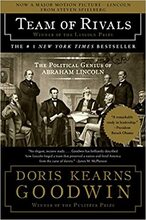
Team of Rivals: The Political Genius of Abraham Lincoln
by Doris Kearns Goodwin Winner of the Lincoln Prize Acclaimed historian Doris Kearns Goodwin illuminates Lincoln's political genius in this highly original work, as the one-term congressman and prairie lawyer rises from obscurity to prevail over three gifted rivals of national reputation to become president. On May 18, 1860, William H. Seward, Salmon P. Chase, Edward Bates, and Abraham Lincoln waited in their hometowns for the results from the Republican National Convention in Chicago. When Lincoln emerged as the victor, his rivals were dismayed and angry. Throughout the turbulent 1850s, each had energetically sought the presidency as the conflict over slavery was leading inexorably to secession and civil war. That Lincoln succeeded, Goodwin demonstrates, was the result of a character that had been forged by experiences that raised him above his more privileged and accomplished rivals. He won because he possessed an extraordinary ability to put himself in the place of other men, to experience what they were feeling, to understand their motives and desires. It was this capacity that enabled Lincoln as president to bring his disgruntled opponents together, create the most unusual cabinet in history, and marshal their talents to the task of preserving the Union and winning the war. We view the long, horrifying struggle from the vantage of the White House as Lincoln copes with incompetent generals, hostile congressmen, and his raucous cabinet. He overcomes these obstacles by winning the respect of his former competitors, and in the case of Seward, finds a loyal and crucial friend to see him through. This brilliant multiple biography is centered on Lincoln's mastery of men and how it shaped the most significant presidency in the nation's history. 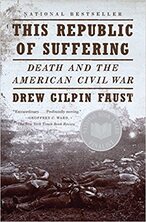
This Republic of Suffering: Death and the American Civil War (Vintage Civil War Library)
by Drew Gilpin Faust More than 600,000 soldiers lost their lives in the American Civil War. An equivalent proportion of today's population would be six million. In This Republic of Suffering, Drew Gilpin Faust reveals the ways that death on such a scale changed not only individual lives but the life of the nation, describing how the survivors managed on a practical level and how a deeply religious culture struggled to reconcile the unprecedented carnage with its belief in a benevolent God. Throughout, the voices of soldiers and their families, of statesmen, generals, preachers, poets, surgeons, nurses, northerners and southerners come together to give us a vivid understanding of the Civil War's most fundamental and widely shared reality. |
1860–1877: The Industrial Age
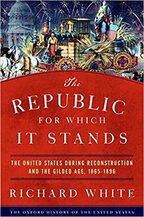
The Republic for Which It Stands: The United States during Reconstruction and the Gilded Age, 1865-1896 (Oxford History of the United States) Illustrated Edition
by Richard White At the end of the Civil War the leaders and citizens of the victorious North envisioned the country's future as a free-labor republic, with a homogenous citizenry, both black and white. The South and West were to be reconstructed in the image of the North. Thirty years later Americans occupied an unimagined world. The unity that the Civil War supposedly secured had proved ephemeral. The country was larger, richer, and more extensive, but also more diverse. Life spans were shorter, and physical well-being had diminished, due to disease and hazardous working conditions. Independent producers had become wage earners. The country was Catholic and Jewish as well as Protestant, and increasingly urban and industrial. The "dangerous" classes of the very rich and poor expanded, and deep differences -- ethnic, racial, religious, economic, and political -- divided society. The corruption that gave the Gilded Age its name was pervasive. These challenges also brought vigorous efforts to secure economic, moral, and cultural reforms. Real change -- technological, cultural, and political -- proliferated from below more than emerging from political leadership. Americans, mining their own traditions and borrowing ideas, produced creative possibilities for overcoming the crises that threatened their country. In a work as dramatic and colorful as the era it covers, White narrates the conflicts and paradoxes of these decades of disorienting change and mounting unrest, out of which emerged a modern nation whose characteristics resonate with the present day. 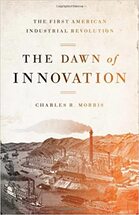
The Dawn of Innovation: The First American Industrial Revolution
by Charles R. Morris In the thirty years after the Civil War, the United States blew by Great Britain to become the greatest economic power in world history. That is a well-known period in history, when titans like Andrew Carnegie, John D. Rockefeller, and J.P. Morgan walked the earth. But as Charles R. Morris shows us, the platform for that spectacular growth spurt was built in the first half of the century. By the 1820s, America was already the world’s most productive manufacturer, and the most intensely commercialized society in history. The War of 1812 jumpstarted the great New England cotton mills, the iron centers in Connecticut and Pennsylvania, and the forges around the Great Lakes. In the decade after the War, the Midwest was opened by entrepreneurs. In this beautifully illustrated book, Morris paints a vivid panorama of a new nation buzzing with the work of creation. He also points out the parallels and differences in the nineteenth century American/British standoff and that between China and America today. |
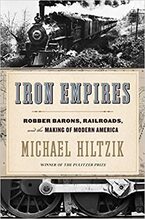
Iron Empires: Robber Barons, Railroads, and the Making of Modern America
by Michael Hiltzik In 1869, when the final spike was driven into the Transcontinental Railroad, few were prepared for its seismic aftershocks. Once a hodgepodge of short, squabbling lines, America’s railways soon exploded into a titanic industry helmed by a pageant of speculators, crooks, and visionaries. The vicious competition between empire builders such as Cornelius Vanderbilt, Jay Gould, J. P. Morgan, and E. H. Harriman sparked stock market frenzies, panics, and crashes; provoked strikes that upended the relationship between management and labor; transformed the nation’s geography; and culminated in a ferocious two-man battle that shook the nation’s financial markets to their foundations and produced dramatic, lasting changes in the interplay of business and government. Spanning four decades and featuring some of the most iconic figures of the Gilded Age, Iron Empires reveals how the robber barons drove the country into the twentieth century—and almost sent it off the rails. 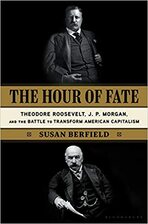
The Hour of Fate: Theodore Roosevelt, J.P. Morgan, and the Battle to Transform American Capitalism
by Susan Berfield It seemed like no force in the world could slow J. P. Morgan's drive to power. In the summer of 1901, the financier was assembling his next mega-deal: Northern Securities, an enterprise that would affirm his dominance in America's most important industry-the railroads. Then, a bullet from an anarchist's gun put an end to the business-friendly presidency of William McKinley. A new chief executive bounded into office: Theodore Roosevelt. He was convinced that as big business got bigger, the government had to check the influence of the wealthiest or the country would inch ever closer to collapse. By March 1902, battle lines were drawn: the government sued Northern Securities for antitrust violations. But as the case ramped up, the coal miners' union went on strike and the anthracite pits that fueled Morgan's trains and heated the homes of Roosevelt's citizens went silent. With millions of dollars on the line, winter bearing down, and revolution in the air, it was a crisis that neither man alone could solve. Richly detailed and propulsively told, The Hour of Fate is the gripping story of a banker and a president thrown together in the crucible of national emergency even as they fought in court. The outcome of the strike and the case would change the course of our history. Today, as the country again asks whether saving democracy means taming capital, the lessons of Roosevelt and Morgan's time are more urgent than ever. |
1877–1920: The Progressive Era
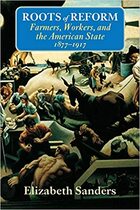
Roots of Reform: Farmers, Workers, and the American State, 1877-1917 (Volume 1999) (American Politics and Political Economy Series)
by Elizabeth Sanders Roots of Reform offers a sweeping revision of our understanding of the rise of the regulatory state in the late nineteenth century. Sanders argues that politically mobilized farmers were the driving force behind most of the legislation that increased national control over private economic power. She demonstrates that farmers from the South, Midwest, and West reached out to the urban laborers who shared their class position and their principal antagonist—northeastern monopolistic industrial and financial capital—despite weak electoral support from organized labor. Based on new evidence from legislative records and other sources, Sanders shows that this tenuous alliance of "producers versus plutocrats" shaped early regulatory legislation, remained powerful through the populist and progressive eras, and developed a characteristic method of democratic state expansion with continued relevance for subsequent reform movements. Roots of Reform is essential reading for anyone interested in this crucial period of American political development. |
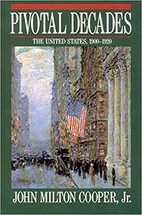
Pivotal Decades: The United States, 1900-1920
by John Milton Cooper Jr. These were the years in which two of our greatest presidents―Theodore Roosevelt and Woodrow Wilson―transformed the office into the center of power; in which the United States entered the world stage and fought its first overseas war; in which the government's proper role in the economy became a public question; and in which reform became an imperative for muckraking reporters, progressive politicians, social activists, and writers. It was a golden age in American politics, when fundamental ideas were given compelling expression by thoughtful candidates. It was a trying time, however, for many Americans, including women who fought for the vote, blacks who began organizing to secure their rights, and activists on the Left who lost theirs in the first Red Scare of the century. John Cooper's panoramic history of this period shows us where we came from and sheds light on where we are. |
1890–1920: American Imperialism
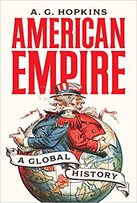
American Empire: A Global History (America in the World)
by A. G. Hopkins American Empire is a panoramic work of scholarship that presents a bold new global perspective on the history of the United States. Drawing on his expertise in economic history and the imperial histories of Britain and Europe, A. G. Hopkins takes readers from the colonial era to today to show how, far from diverging, the United States and Western Europe followed similar trajectories throughout this long period, and how America’s dependency on Britain and Europe extended much later into the nineteenth century than previously understood. In a sweeping narrative spanning three centuries, Hopkins describes how the revolt of the mainland colonies was the product of a crisis that afflicted the imperial states of Europe generally, and how the history of the American republic between 1783 and 1865 was a response not to the termination of British influence but to its continued expansion. He traces how the creation of a U.S. industrial nation-state after the Civil War paralleled developments in Western Europe, fostered similar destabilizing influences, and found an outlet in imperialism through the acquisition of an insular empire in the Caribbean and Pacific. The period of colonial rule that followed reflected the history of the European empires in its ideological justifications, economic relations, and administrative principles. After 1945, a profound shift in the character of globalization brought the age of the great territorial empires to an end. American Empire goes beyond the myth of American exceptionalism to place the United States within the wider context of the global historical forces that shaped the Western empires and the world. |
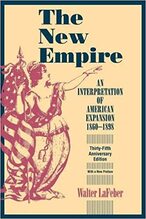
The New Empire
by Walter F. LaFeber This classic work, by the distinguished historian Walter LaFeber, presents his widely influential argument that economic causes were the primary forces propelling America to world power in the nineteenth century. Cornell University Press is proud to issue this thirty-fifth anniversary edition, featuring a new preface by the author. "In this Beveridge Award-winning study, Walter LaFeber... probes beneath the apparently quiet surface of late nineteenth-century American diplomacy, undisturbed by major wars and undistinguished by important statements of policy. He finds those who shaped American diplomacy believed expanding foreign markets were the cure for recurring depressions.... In thoroughly documenting economic pressure on American foreign policy of the late nineteenth century, the author has illuminated a shadowy corner of the national experience.... The theory that America was thrust by events into a position of world power it never sought and was unprepared to discharge must now be re-examined. Also brought into question is the thesis that American policymakers have depended for direction on the uncertain compass of utopian idealism."―American Historical Review |
1914–1918: World War I
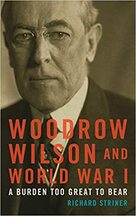
Woodrow Wilson and World War I: A Burden Too Great to Bear
by Richard Striner Woodrow Wilson is often considered one of the greatest presidents in American history because, in the first two years of his presidency, he succeeded on many fronts. However, acclaimed author and historian Richard Striner now makes the case that a presidency that is too often idealized was full of missteps and failures that profoundly affected America’s politics and people long after it ended. While other negative assessments of Wilson's leadership have been one-sided, Striner's critique—though undoubtedly scathing—is judicious, nuanced, and fair. With detailed description and accessible prose, Striner sheds light on how—as soon as America entered World War I—flaws of Wilson’s were exposed as the pressure on his administration mounted. This book is a story of presidential failure, a chronicle of Woodrow Wilson’s miscalculations in war, and a harrowing account of the process through which an intelligent American leader fell to pieces under a burden he could not bear. 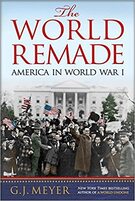
The World Remade: America in World War
by G. J. Meyer After years of bitter debate, the United States declared war on Imperial Germany on April 6, 1917, plunging the country into the savage European conflict that would redraw the map of the continent—and the globe. The World Remade is an engrossing chronicle of America’s pivotal, still controversial intervention into World War I, encompassing the tumultuous politics and towering historical figures that defined the era and forged the future. When it declared war, the United States was the youngest of the major powers and militarily the weakest by far. On November 11, 1918, when the fighting stopped, it was not only the richest country on earth but the mightiest. |
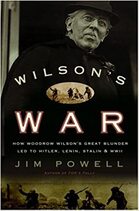
Wilson's War: How Woodrow Wilson's Great Blunder Led to Hitler, Lenin, Stalin, and World War II
by Jim Powell President Woodrow Wilson famously rallied the United States to enter World War I by saying the nation had a duty to make “the world safe for democracy.” But as historian Jim Powell demonstrates in this shocking reappraisal, Wilson actually made a horrible blunder by committing the United States to fight. Far from making the world safe for democracy, America’s entry into the war opened the door to murderous tyrants and Communist rulers. No other president has had a hand—however unintentional—in so much destruction. That’s why, Powell declares, “Wilson surely ranks as the worst president in American history.” Wilson’s War reveals the horrifying consequences of our twenty-eighth president’s fateful decision to enter the fray in Europe. It led to millions of additional casualties in a war that had ground to a stalemate. And even more disturbing were the long-term consequences—consequences that played out well after Wilson’s death. Powell convincingly demonstrates that America’s armed forces enabled the Allies to win a decisive victory they would not otherwise have won—thus enabling them to impose the draconian surrender terms on Germany that paved the way for Adolf Hitler’s rise to power. Powell also shows how Wilson’s naiveté and poor strategy allowed the Bolsheviks to seize power in Russia. Given a boost by Woodrow Wilson, Lenin embarked on a reign of terror that continued under Joseph Stalin. The result of Wilson’s blunder was seventy years of Soviet Communism, during which time the Communist government murdered some sixty million people. Just as Powell’s FDR’s Folly exploded the myths about Franklin Roosevelt and the New Deal, Wilson’s War destroys the conventional image of Woodrow Wilson as a great “progressive” who showed how the United States can do good by intervening in the affairs of other nations. Jim Powell delivers a stunning reminder that we should focus less on a president’s high-minded ideals and good intentions than on the consequences of his actions. |
1918–1929: Social Changes
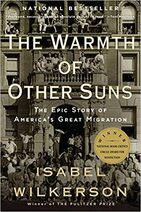
The Warmth of Other Suns: The Epic Story of America's Great Migration
by Isabel Wilkerson In this epic, beautifully written masterwork, Pulitzer Prize–winning author Isabel Wilkerson chronicles one of the great untold stories of American history: the decades-long migration of black citizens who fled the South for northern and western cities, in search of a better life. NATIONAL BOOK CRITICS CIRCLE AWARD WINNER From 1915 to 1970, this exodus of almost six million people changed the face of America. Wilkerson compares this epic migration to the migrations of other peoples in history. She interviewed more than a thousand people, and gained access to new data and official records, to write this definitive and vividly dramatic account of how these American journeys unfolded, altering our cities, our country, and ourselves. With stunning historical detail, Wilkerson tells this story through the lives of three unique individuals: Ida Mae Gladney, who in 1937 left sharecropping and prejudice in Mississippi for Chicago, where she achieved quiet blue-collar success and, in old age, voted for Barack Obama when he ran for an Illinois Senate seat; sharp and quick-tempered George Starling, who in 1945 fled Florida for Harlem, where he endangered his job fighting for civil rights, saw his family fall, and finally found peace in God; and Robert Foster, who left Louisiana in 1953 to pursue a medical career, the personal physician to Ray Charles as part of a glitteringly successful medical career, which allowed him to purchase a grand home where he often threw exuberant parties. Wilkerson brilliantly captures their first treacherous and exhausting cross-country trips by car and train and their new lives in colonies that grew into ghettos, as well as how they changed these cities with southern food, faith, and culture and improved them with discipline, drive, and hard work. Both a riveting microcosm and a major assessment, The Warmth of Other Suns is a bold, remarkable, and riveting work, a superb account of an “unrecognized immigration” within our own land. Through the breadth of its narrative, the beauty of the writing, the depth of its research, and the fullness of the people and lives portrayed herein, this book is destined to become a classic. |
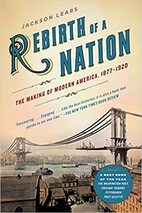
Rebirth of a Nation: The Making of Modern America, 1877-1920
by Jackson Lears In the half-century between the Civil War and World War I, dreams of spiritual, moral, and physical rebirth formed the foundation for the modern United States. Inspired by imperial ambition, presidents and entrepreneurs; from Theodore Roosevelt and Woodrow Wilson to Andrew Carnegie; helped usher the nation into the modern era, but sometimes the consequences of their actions failed to match the grandeur of their hopes. Award-winning historian Jackson Lears richly chronicles this momentous period in America; years marked by wrenching social conflict and vigorous political debate; vividly capturing the roles played by a variety of seekers, from Gilded Age mavericks to vaudeville entertainers, and from populist farmers and progressive reformers to avant-garde artists and writers. Illuminating and authoritative, Rebirth of a Nation brilliantly weaves the remarkable story of this crucial epoch into a masterful work of history. 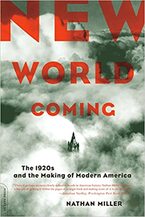
New World Coming: The 1920s And The Making Of Modern America
by Nathan Miller The images of the 1920s have been indelibly imprinted on the American imagination-from jazz, bootleggers, flappers, talkies, the Model T Ford, Babe Ruth, and Charles Lindbergh to the fight for women's right to vote, racial injustice, and the birth of organized crime. Nathan Miller has penned the ultimate introduction to the era. Publishers Weekly calls it "an excellent chronicle of that turbulent, troubled, and tempestuous decade," and Jonathan Yardley's Washington Post review proclaimed this the new classic history of the 1920s, replacing Frederick Lewis Allen's celebrated account.Using the life of F. Scott Fitzgerald as a backdrop, Miller describes the world of Calvin Coolidge, H. L. Mencken, Woodrow Wilson, and the Red Scare in extraordinarily accessible (and frequently witty) writing, New World Coming is destined to become the book we all turn to to recall one of the most beloved eras in American history. |
1929–1941: Great Depression
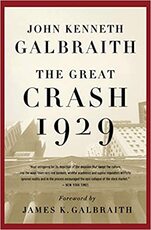
The Great Crash 1929
by John Kenneth Galbraith Of Galbraith's classic examination of the 1929 financial collapse, the Atlantic Monthly said: "Economic writings are seldom notable for their entertainment value, but this book is. Galbraith's prose has grace and wit, and he distills a good deal of sardonic fun from the whopping errors of the nation's oracles and the wondrous antics of the financial community." Now, with the stock market riding historic highs, the celebrated economist returns with new insights on the legacy of our past and the consequences of blind optimism and power plays within the financial community. 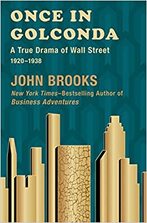
Once in Golconda: A True Drama of Wall Street 1920-1938
by John Brooks Once in Golconda "In this book, John Brooks-who was one of the most elegant of all business writers-perfectly catches the flavor of one of history's best-known financial dramas: the 1929 crash and its aftershocks. It's packed with parallels and parables for the modern reader." -From the Foreword by Richard Lambert Editor-in-Chief, The Financial Times Once in Golconda is a dramatic chronicle of the breathtaking rise, devastating fall, and painstaking rebirth of Wall Street in the years between the wars. Focusing on the lives and fortunes of some of the era's most memorable traders, bankers, boosters, and frauds, John Brooks brings to vivid life all the ruthlessness, greed, and reckless euphoria of the '20s bull market, the desperation of the days leading up to the crash of '29, and the bitterness of the years that followed. Praise for Once in Golconda "A fast-moving, sophisticated account.embracing the stock-market boom of the twenties, the crash of 1929, the Depression, and the coming of the New Deal. Its leitmotif is the truly tragic personal history of Richard Whitney, the aristocrat Morgan broker and head of the Stock Exchange, who ended up in Sing Sing." -Edmund Wilson, writing in the New Yorker "As Mr. Brooks tells this tale of dishonor, desperation, and the fall of the mighty, it takes on overtones of Greek tragedy, a king brought down by pride. Whitney's sordid history has been told before..But in Mr. Brooks's hands, the drama becomes freshly shocking." -Wall Street Journal "It's all there in Once in Golconda-the avarice of an era that favored the rich; and the later anguish of myriads of speculators doomed by a bloated market, easy credit, and their own cupidity and stupidity." -Saturday Review |
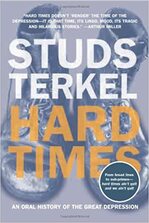
Hard Times: An Oral History of the Great Depression
by Studs Terkel From the Pulitzer Prize–winning author of The Good War: A masterpiece of modern journalism and “a huge anthem in praise of the American spirit” (Saturday Review). In this “invaluable record” of one of the most dramatic periods in modern American history, Studs Terkel recaptures the Great Depression of the 1930s in all its complexity. Featuring a mosaic of memories from politicians, businessmen, artists, striking workers, and Okies, from those who were just kids to those who remember losing a fortune, Hard Times is not only a gold mine of information but a fascinating interplay of memory and fact, revealing how the 1929 stock market crash and its repercussions radically changed the lives of a generation. The voices that speak from the pages of this unique book are as timeless as the lessons they impart (The New York Times). “Hard Times doesn’t ‘render’ the time of the depression―it is that time, its lingo, mood, its tragic and hilarious stories.” ―Arthur Miller “Wonderful! The American memory, the American way, the American voice. It will resurrect your faith in all of us to read this book.” ―Newsweek “Open Studs Terkel’s book to almost any page and rich memories spill out . . . Read a page, any page. Then try to stop.” ―The National Observer 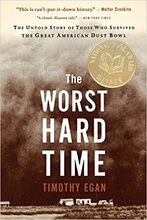
The Worst Hard Time: The Untold Story of Those Who Survived the Great American Dust Bowl
by Timothy Egan The dust storms that terrorized the High Plains in the darkest years of the Depression were like nothing ever seen before or since. Timothy Egan’s critically acclaimed account rescues this iconic chapter of American history from the shadows in a tour de force of historical reportage. Following a dozen families and their communities through the rise and fall of the region, Egan tells of their desperate attempts to carry on through blinding black dust blizzards, crop failure, and the death of loved ones. Brilliantly capturing the terrifying drama of catastrophe, Egan does equal justice to the human characters who become his heroes, “the stoic, long-suffering men and women whose lives he opens up with urgency and respect” (New York Times). In an era that promises ever-greater natural disasters, The Worst Hard Time is “arguably the best nonfiction book yet” (Austin Statesman Journal) on the greatest environmental disaster ever to be visited upon our land and a powerful cautionary tale about the dangers of trifling with nature. |
1939–1945: World War II
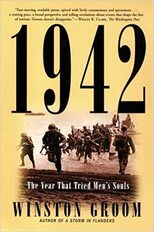
1942: The Year That Tried Men's Souls
by Winston Groom From the author of Forrest Gump and A Storm in Flanders comes a riveting chronicle of America's most critical hour. On December 6, 1941, an unexpected attack on American territory pulled an unprepared country into a terrifying new brand of warfare. Novelist and popular historian Winston Groom vividly re-creates the story of America's first year in World War II. To the generation of Americans who lived through it, the Second World War was the defining event of the twentieth century, and the defining events of that war were played out in the year 1942. This account covers the Allies' relentless defeats as the Axis overran most of Europe, North Africa, and the Far East. But midyear the tide began to turn. America finally went on the offensive in the Pacific, and in the west the British defeated Rommel's panzer divisions at El Alamein while the U.S. Army began to push the Germans out of North Africa. By the year's end, the smell of victory was in the air. 1942, told with Groom's accomplished storyteller's eye, allows us into the admirals' strategy rooms, onto the battle fronts, and into the heart of a nation at war. 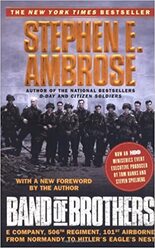
Band of Brothers: E Company, 506th Regiment, 101st Airborne from Normandy to Hitler's Eagle's Nest
by Stephen E. Ambrose “Eugene Sledge became more than a legend with his memoir, With The Old Breed. He became a chronicler, a historian, a storyteller who turns the extremes of the war in the Pacific—the terror, the camaraderie, the banal and the extraordinary—into terms we mortals can grasp.”—Tom Hanks NEW YORK TIMES BESTSELLER In The Wall Street Journal, Victor Davis Hanson named With the Old Breed one of the top five books on epic twentieth-century battles. Studs Terkel interviewed the author for his definitive oral history, The Good War. Now E. B. Sledge’s acclaimed first-person account of fighting at Peleliu and Okinawa returns to thrill, edify, and inspire a new generation. An Alabama boy steeped in American history and enamored of such heroes as George Washington and Daniel Boone, Eugene B. Sledge became part of the war’s famous 1st Marine Division—3rd Battalion, 5th Marines. Even after intense training, he was shocked to be thrown into the battle of Peleliu, where “the world was a nightmare of flashes, explosions, and snapping bullets.” By the time Sledge hit the hell of Okinawa, he was a combat vet, still filled with fear but no longer with panic. Based on notes Sledge secretly kept in a copy of the New Testament, With the Old Breed captures with utter simplicity and searing honesty the experience of a soldier in the fierce Pacific Theater. Here is what saved, threatened, and changed his life. Here, too, is the story of how he learned to hate and kill—and came to love—his fellow man. “In all the literature on the Second World War, there is not a more honest, realistic or moving memoir than Eugene Sledge’s. This is the real deal, the real war: unvarnished, brutal, without a shred of sentimentality or false patriotism, a profound primer on what it actually was like to be in that war. It is a classic that will outlive all the armchair generals’ safe accounts of—not the ‘good war’—but the worst war ever.”—Ken Burns |
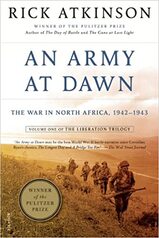
An Army at Dawn: The War in North Africa, 1942-1943, Volume One of the Liberation Trilogy (The Liberation Trilogy, 1)
by Rick Atkinson WINNER OF THE PULITZER PRIZE AND NEW YORK TIMES BESTSELLER "A splendid book... The emphasis throughout is on the human drama of men at war."―The Washington Post Book World The liberation of Europe and the destruction of the Third Reich is an epic story of courage and calamity, of miscalculation and enduring triumph. In this first volume of the Liberation Trilogy, Rick Atkinson shows why no modern reader can understand the ultimate victory of the Allied powers without a grasp of the great drama that unfolded in North Africa in 1942 and 1943. Opening with the daring amphibious invasion in November 1942, An Army at Dawn follows the American and British armies as they fight the French in Morocco and Algiers, and then take on the Germans and Italians in Tunisia. Battle by battle, an inexperienced and sometimes poorly led army gradually becomes a superb fighting force. At the center of the tale are the extraordinary but flawed commanders who come to dominate the battlefield: Eisenhower, Patton, Bradley, Montgomery, and Rommel. Brilliantly researched, rich with new material and vivid insights, Atkinson's vivid narrative tells the deeply human story of a monumental battle for the future of civilization. 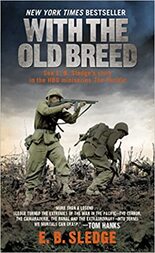
With the Old Breed: At Peleliu and Okinawa
by E.B. Sledge “Eugene Sledge became more than a legend with his memoir, With The Old Breed. He became a chronicler, a historian, a storyteller who turns the extremes of the war in the Pacific—the terror, the camaraderie, the banal and the extraordinary—into terms we mortals can grasp.”—Tom Hanks NEW YORK TIMES BESTSELLER In The Wall Street Journal, Victor Davis Hanson named With the Old Breed one of the top five books on epic twentieth-century battles. Studs Terkel interviewed the author for his definitive oral history, The Good War. Now E. B. Sledge’s acclaimed first-person account of fighting at Peleliu and Okinawa returns to thrill, edify, and inspire a new generation. An Alabama boy steeped in American history and enamored of such heroes as George Washington and Daniel Boone, Eugene B. Sledge became part of the war’s famous 1st Marine Division—3rd Battalion, 5th Marines. Even after intense training, he was shocked to be thrown into the battle of Peleliu, where “the world was a nightmare of flashes, explosions, and snapping bullets.” By the time Sledge hit the hell of Okinawa, he was a combat vet, still filled with fear but no longer with panic. Based on notes Sledge secretly kept in a copy of the New Testament, With the Old Breed captures with utter simplicity and searing honesty the experience of a soldier in the fierce Pacific Theater. Here is what saved, threatened, and changed his life. Here, too, is the story of how he learned to hate and kill—and came to love—his fellow man. “In all the literature on the Second World War, there is not a more honest, realistic or moving memoir than Eugene Sledge’s. This is the real deal, the real war: unvarnished, brutal, without a shred of sentimentality or false patriotism, a profound primer on what it actually was like to be in that war. It is a classic that will outlive all the armchair generals’ safe accounts of—not the ‘good war’—but the worst war ever.”—Ken Burns |
1945–1989: Cold War
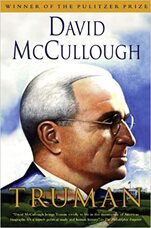
Truman
by David McCullough The Pulitzer Prize–winning biography of Harry S. Truman, whose presidency included momentous events from the atomic bombing of Japan to the outbreak of the Cold War and the Korean War, told by America’s beloved and distinguished historian. The life of Harry S. Truman is one of the greatest of American stories, filled with vivid characters—Roosevelt, Churchill, Stalin, Eleanor Roosevelt, Bess Wallace Truman, George Marshall, Joe McCarthy, and Dean Acheson—and dramatic events. In this riveting biography, acclaimed historian David McCullough not only captures the man—a more complex, informed, and determined man than ever before imagined—but also the turbulent times in which he rose, boldly, to meet unprecedented challenges. The last president to serve as a living link between the nineteenth and the twentieth centuries, Truman’s story spans the raw world of the Missouri frontier, World War I, the powerful Pendergast machine of Kansas City, the legendary Whistle-Stop Campaign of 1948, and the decisions to drop the atomic bomb, confront Stalin at Potsdam, send troops to Korea, and fire General MacArthur. Drawing on newly discovered archival material and extensive interviews with Truman’s own family, friends, and Washington colleagues, McCullough tells the deeply moving story of the seemingly ordinary “man from Missouri” who was perhaps the most courageous president in our history. 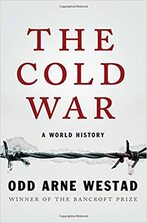
The Cold War: A World History
by Odd Arne Westad We tend to think of the Cold War as a bounded conflict: a clash of two superpowers, the United States and the Soviet Union, born out of the ashes of World War II and coming to a dramatic end with the collapse of the Soviet Union. But in this major new work, Bancroft Prize-winning scholar Odd Arne Westad argues that the Cold War must be understood as a global ideological confrontation, with early roots in the Industrial Revolution and ongoing repercussions around the world. In The Cold War, Westad offers a new perspective on a century when great power rivalry and ideological battle transformed every corner of our globe. From Soweto to Hollywood, Hanoi, and Hamburg, young men and women felt they were fighting for the future of the world. The Cold War may have begun on the perimeters of Europe, but it had its deepest reverberations in Asia, Africa, and the Middle East, where nearly every community had to choose sides. And these choices continue to define economies and regimes across the world. Today, many regions are plagued with environmental threats, social divides, and ethnic conflicts that stem from this era. Its ideologies influence China, Russia, and the United States; Iraq and Afghanistan have been destroyed by the faith in purely military solutions that emerged from the Cold War. Stunning in its breadth and revelatory in its perspective, this book expands our understanding of the Cold War both geographically and chronologically, and offers an engaging new history of how today's world was created. |
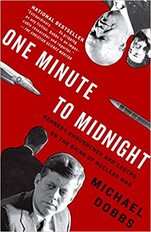
One Minute to Midnight: Kennedy, Khrushchev, and Castro on the Brink of Nuclear War
by Michael Dobbs In October 1962, at the height of the Cold War, the United States and the Soviet Union came to the brink of nuclear conflict over the placement of Soviet missiles in Cuba. In this hour-by-hour chronicle of those tense days, veteran Washington Post reporter Michael Dobbs reveals just how close we came to Armageddon. Here, for the first time, are gripping accounts of Khrushchev's plan to destroy the U.S. naval base at Guantánamo; the handling of Soviet nuclear warheads on Cuba; and the extraordinary story of a U-2 spy plane that got lost over Russia at the peak of the crisis. Written like a thriller, One Minute to Midnight is an exhaustively researched account of what Arthur Schlesinger, Jr. called “the most dangerous moment in human history,” and the definitive book on the Cuban missile crisis. 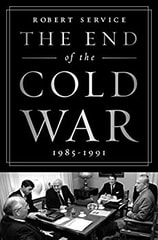
The End of the Cold War: 1985-1991
by Robert Service On 26 December, 1991, the hammer-and-sickle flag was lowered over the Kremlin for the last time. Yet, just six years earlier, when Mikhail Gorbachëv became general secretary of the Communist Party of the Soviet Union and chose Eduard Shevardnadze as his foreign minister, the Cold War seemed like a permanent fixture in world politics. Until its denouement, no Western or Soviet politician foresaw that the standoff between the two superpowers—after decades of struggle over every aspect of security, politics, economics, and ideas—would end within the lifetime of the current generation. Nor was it at all obvious that that the Soviet political leadership would undertake a huge internal reform of the USSR, or that the threat of a nuclear Armageddon could or would be peacefully wound down. Drawing on pioneering archival research, Robert Service's gripping investigation of the final years of the Cold War pinpoints the extraordinary relationships between Ronald Reagan, Gorbachëv, George Shultz, and Shevardnadze, who found ways to cooperate during times of exceptional change around the world. A story of American pressure and Soviet long-term decline and overstretch, The End of the Cold War: 1985–1991 shows how a small but skillful group of statesmen grew determined to end the Cold War on their watch and transformed the global political landscape irreversibly. |
1946–1959: Postwar New World
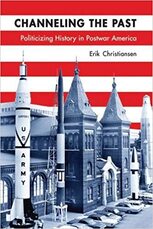
Channeling the Past: Politicizing History in Postwar America (Studies in American Thought and Culture)
by Erik Christiansen After the turmoil of the Great Depression and World War II, Americans looked to the nation’s more distant past for lessons to inform its uncertain future. By applying recent and emerging techniques in mass communication—including radio and television programs and commercial book clubs—American elites working in media, commerce, and government used history to confer authority on their respective messages. With insight and wit, Erik Christiansen uncovers in Channeling the Past the ways that powerful corporations rewrote history to strengthen the postwar corporate state, while progressives, communists, and other leftists vied to make their own versions of the past more popular. Christiansen looks closely at several notable initiatives—CBS’s flashback You Are There program; the Smithsonian Museum of American History, constructed in the late 1950s; the Cavalcade of America program sponsored by the Du Pont Company; the History Book Club; and the Freedom Train, a museum on rails that traveled the country from 1947 to 1949 exhibiting historic documents and flags, including original copies of the U.S. Constitution and the Magna Carta. It is often said that history is written by the victors, but Christiansen offers a more nuanced perspective: history is constantly remade to suit the objectives of those with the resources to do it. He provides dramatic evidence of sophisticated calculations that influenced both public opinion and historical memory, and shows that Americans’ relationships with the past changed as a result. 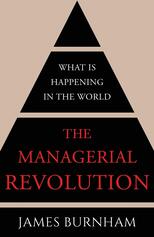
The Managerial Revolution: What is Happening in the World
by James Burnham Burnham's claim was that capitalism was dead, but that it was being replaced not by socialism, but a new economic system he called "managerialism"; rule by managers. Written in 1941, this is the book that theorised how the world was moving into the hands of the 'managers'. Burnham explains how Capitalism had virtually lost its control, and would be displaced not by labour, nor by socialism, but by the rule of administartors in business and in government. This revolution, he posited, is as broad as the world and as comprehensive as human society, asking "Why is 'totalitarianism' not the issue?" "Can civilization be destroyed?" And "Why is the New Deal something bigger than Roosevelt can handle?" In a volume extraordinary for its dispassionate handling of those and other fundamental questions, James Burnham explores fully the implications of the managerial revolution. |
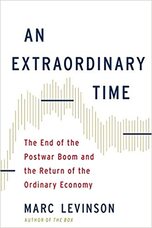
An Extraordinary Time: The End of the Postwar Boom and the Return of the Ordinary
by Marc Levinson The decades after World War II were a golden age across much of the world. It was a time of economic miracles, an era when steady jobs were easy to find and families could see their living standards improving year after year. And then, around 1973, the good times vanished. The world economy slumped badly, then settled into the slow, erratic growth that had been the norm before the war. The result was an era of anxiety, uncertainty, and political extremism that we are still grappling with today. In An Extraordinary Time, acclaimed economic historian Marc Levinson describes how the end of the postwar boom reverberated throughout the global economy, bringing energy shortages, financial crises, soaring unemployment, and a gnawing sense of insecurity. Politicians, suddenly unable to deliver the prosperity of years past, railed haplessly against currency speculators, oil sheikhs, and other forces they could not control. From Sweden to Southern California, citizens grew suspicious of their newly ineffective governments and rebelled against the high taxes needed to support social welfare programs enacted when coffers were flush. Almost everywhere, the pendulum swung to the right, bringing politicians like Margaret Thatcher and Ronald Reagan to power. But their promise that deregulation, privatization, lower tax rates, and smaller government would restore economic security and robust growth proved unfounded. Although the guiding hand of the state could no longer deliver the steady economic performance the public had come to expect, free-market policies were equally unable to do so. The golden age would not come back again. A sweeping reappraisal of the last sixty years of world history, An Extraordinary Time forces us to come to terms with how little control we actually have over the economy. |
1960–1968: New Frontiers
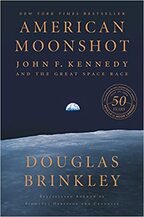
American Moonshot: John F. Kennedy and the Great Space Race
by Douglas Brinkley “We choose to go to the Moon in this decade and do the other things, not because they are easy, but because they are hard; because that goal will serve to organize and measure the best of our energies and skills, because that challenge is one that we are willing to accept, one we are unwilling to postpone, and one we intend to win.”—President John F. Kennedy On May 25, 1961, JFK made an astonishing announcement: his goal of putting a man on the moon by the end of the decade. In this engrossing, fast-paced epic, Douglas Brinkley returns to the 1960s to recreate one of the most exciting and ambitious achievements in the history of humankind. American Moonshot brings together the extraordinary political, cultural, and scientific factors that fueled the birth and development of NASA and the Mercury, Gemini and Apollo projects, which shot the United States to victory in the space race against the Soviet Union at the height of the Cold War. Drawing on new primary source material and major interviews with many of the surviving figures who were key to America’s success, Brinkley brings this fascinating history to life as never before. American Moonshot is a portrait of the brilliant men and women who made this giant leap possible, the technology that enabled us to propel men beyond earth’s orbit to the moon and return them safely, and the geopolitical tensions that spurred Kennedy to commit himself fully to this audacious dream. Brinkley’s ensemble cast of New Frontier characters include rocketeer Wernher von Braun, astronaut John Glenn and space booster Lyndon Johnson. A vivid and enthralling chronicle of one of the most thrilling, hopeful, and turbulent eras in the nation’s history, American Moonshot is an homage to scientific ingenuity, human curiosity, and the boundless American spirit. |
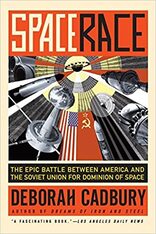
Space Race: The Epic Battle Between America and the Soviet Union for Dominion of Space
by Deborah Cadbury One of the most exhilarating true adventures in history, the race into space was marked by courage, duplicity, political paranoia, astonishing technological feats, and unbelievable triumphs in the face of overwhelming adversity. It is the story of an unparalleled rivalry between superpowers and of the two remarkable men at the center of the conflict. On the American side was Wernher von Braun, the camera-friendly former Nazi scientist, who was granted hero status and almost unlimited resources by a government panicked at the thought of the Cold War enemy taking the lead. The Soviet program was headed by Sergei Korolev, a former political prisoner whose identity was a closely guarded state secret. Korolev was expected to—and did—work miracles on a shoestring budget, his cooperation assured through intimidation and threats of possible disgrace or death. These rivals were opposite in every way, save for one: each was obsessed with the idea of launching a man to the Moon. Deborah Cadbury's extraordinary history combines action and suspense with a moving portrayal of the space race's human dimension. Using source materials never before available, she tells a riveting story of the espionage, ambition, ingenuity, and passion behind humankind's mind-bending voyage beyond the bounds of Earth. |
1954–1968: Civil Rights Movement
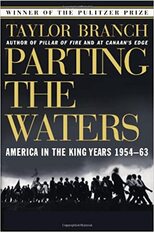
Parting the Waters : America in the King Years 1954-63
by Taylor Branch In Parting the Waters, the first volume of his essential America in the King Years series, Pulitzer Prize winner Taylor Branch gives a “compelling…masterfully told” (The Wall Street Journal) account of Martin Luther King’s early years and rise to greatness. Hailed as the most masterful story ever told of the American Civil Rights Movement, Parting the Waters is destined to endure for generations. Moving from the fiery political baptism of Martin Luther King, Jr., to the corridors of Camelot where the Kennedy brothers weighed demands for justice against the deceptions of J. Edgar Hoover, here is a vivid tapestry of America, torn and finally transformed by a revolutionary struggle unequaled since the Civil War. Taylor Branch provides an unsurpassed portrait of King's rise to greatness and illuminates the stunning courage and private conflict, the deals, maneuvers, betrayals, and rivalries that determined history behind closed doors, at boycotts and sit-ins, on bloody freedom rides, and through siege and murder. Epic in scope and impact, Branch's chronicle definitively captures one of the nation's most crucial passages. |
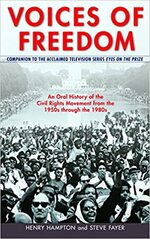
Voices of Freedom: An Oral History of the Civil Rights Movement from the 1950s Through the 1980s
by Henry Hampton, Steve Fayer, Sarah Flynn “A vast choral pageant that recounts the momentous work of the civil rights struggle.”—The New York Times Book Review A monumental volume drawing upon nearly one thousand interviews with civil rights activists, politicians, reporters, Justice Department officials, and others, weaving a fascinating narrative of the civil rights movement told by the people who lived it Join brave and terrified youngsters walking through a jeering mob and up the steps of Central High School in Little Rock. Listen to the vivid voices of the ordinary people who manned the barricades, the laborers, the students, the housewives without whom there would have been no civil rights movements at all. In this remarkable oral history, Henry Hampton, creator and executive producer of the acclaimed PBS series Eyes on the Prize, and Steve Fayer, series writer, bring to life the country’s great struggle for civil rights as no conventional narrative can. You will hear the voices of those who defied the blackjacks, who went to jail, who witnessed and policed the movement; of those who stood for and against it—voices from the heart of America. |
1954–1975: Vietnam War Years
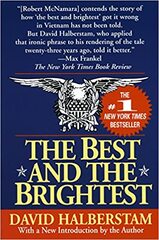
The Best and the Brightest
by David Halberstam David Halberstam’s masterpiece, the defining history of the making of the Vietnam tragedy, with a new Foreword by Senator John McCain. "A rich, entertaining, and profound reading experience.”—The New York Times Using portraits of America’ s flawed policy makers and accounts of the forces that drove them, The Best and the Brightest reckons magnificently with the most important abiding question of our country’s recent history: Why did America become mired in Vietnam, and why did we lose? As the definitive single-volume answer to that question, this enthralling book has never been superseded. It is an American classic. 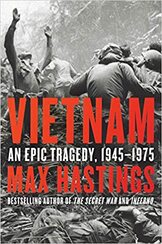
Vietnam: An Epic Tragedy, 1945-1975
by Max Hastings An absorbing and definitive modern history of the Vietnam War from the acclaimed New York Times bestselling author of The Secret War. Vietnam became the Western world’s most divisive modern conflict, precipitating a battlefield humiliation for France in 1954, then a vastly greater one for the United States in 1975. Max Hastings has spent the past three years interviewing scores of participants on both sides, as well as researching a multitude of American and Vietnamese documents and memoirs, to create an epic narrative of an epic struggle. He portrays the set pieces of Dien bien phu, the 1968 Tet offensive, the air blitz of North Vietnam, and also much less familiar miniatures such as the bloodbath at Daido, where a US Marine battalion was almost wiped out, together with extraordinary recollections of Ho Chi Minh’s warriors. Here are the vivid realities of strife amid jungle and paddies that killed two million people. Many writers treat the war as a US tragedy, yet Hastings sees it as overwhelmingly that of the Vietnamese people, of whom forty died for every American. US blunders and atrocities were matched by those committed by their enemies. While all the world has seen the image of a screaming, naked girl seared by napalm, it forgets countless eviscerations, beheadings, and murders carried out by the communists. The people of both former Vietnams paid a bitter price for the Northerners’ victory in privation and oppression. Here is testimony from Vietcong guerrillas, Southern paratroopers, Saigon bargirls, and Hanoi students alongside that of infantrymen from South Dakota, Marines from North Carolina, and Huey pilots from Arkansas. No past volume has blended a political and military narrative of the entire conflict with heart-stopping personal experiences, in the fashion that Max Hastings’ readers know so well. The author suggests that neither side deserved to win this struggle with so many lessons for the twenty-first century about the misuse of military might to confront intractable political and cultural challenges. He marshals testimony from warlords and peasants, statesmen and soldiers, to create an extraordinary record. 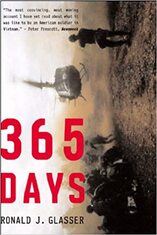
365 Days
by Ronald J. Glasser Over 200,000 copies sold in all editions. A new edition of Ron Glasser's classic account of the Vietnam War. 365 Days stands not only as a compelling account of this tragic conflict, but as a powerful antiwar statement. Nothing speaks so convincingly against the evils of war as the evils themselves. In this gripping account of the human cost of the Vietnam War, Ron Glasser offers an unparalleled description of the horror endured daily by those on the front lines. "The stories I have tried to tell here are true," says Glasser in his foreword. "Those that happened in Japan I was part of; the rest are from the boys I met. I would have liked to disbelieve some of them, and at first I did, but I was there long enough to hear the same stories again and again, and then to see part of it myself." Assigned to Zama, an Army hospital in Japan in September 1968, Glasser arrived as a pediatrician in the U.S. Army Medical Corps to care for the children of officers and high-ranking government officials. The hospital's main mission, however, was to support the war and care for the wounded. At Zama, an average of six to eight thousand patients were attended to per month, and the death and suffering were staggering. The soldiers counted their days by the length of their tour one year, or 365 days and they knew, down to the day, how much time they had left. Glasser tells their stories of lives shockingly interrupted by the tragedies of war with moving, humane eloquence. |
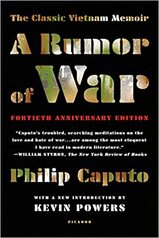
A Rumor of War: The Classic Vietnam Memoir
by Philip Caputo, Kevin Powers (Foreword) The 40th anniversary edition of the classic Vietnam memoir―featured in the PBS documentary series The Vietnam War by Ken Burns and Lynn Novick―with a new foreword by Kevin Powers In March of 1965, Lieutenant Philip J. Caputo landed at Danang with the first ground combat unit deployed to Vietnam. Sixteen months later, having served on the line in one of modern history’s ugliest wars, he returned home―physically whole but emotionally wasted, his youthful idealism forever gone. A Rumor of War is far more than one soldier’s story. Upon its publication in 1977, it shattered America’s indifference to the fate of the men sent to fight in the jungles of Vietnam. In the years since then, it has become not only a basic text on the Vietnam War but also a renowned classic in the literature of wars throughout history and, as the author writes, of "the things men do in war and the things war does to them." "Heartbreaking, terrifying, and enraging. It belongs to the literature of men at war." ―Los Angeles Times Book Review 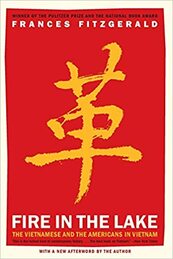
Fire in the Lake: The Vietnamese and the Americans in Vietnam
by Frances FitzGerald Frances FitzGerald's landmark history of Vietnam and the Vietnam War, "A compassionate and penetrating account of the collision of two societies that remain untranslatable to one another." (New York Times Book Review) This magisterial work, based on Frances FitzGerald's many years of research and travels, takes us inside the history of Vietnam--the traditional, ancestor-worshiping villages, the conflicts between Communists and anti-Communists, Catholics and Buddhists, generals and monks, the disruption created by French colonialism, and America's ill-fated intervention--and reveals the country as seen through Vietnamese eyes. Originally published in 1972, FIRE IN THE LAKE was the first history of Vietnam written by an American, and subsequently won the Pulitzer Prize, the Bancroft Prize, and the National Book Award. With a clarity and insight unrivaled by any author before it or since, Frances FitzGerald illustrates how America utterly and tragically misinterpreted the realities of Vietnam. 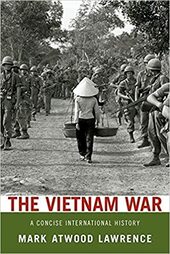
The Vietnam War: A Concise International History
by Mark Atwood Lawrence The Vietnam War remains a topic of extraordinary interest, not least because of striking parallels between that conflict and more recent fighting in the Middle East. In The Vietnam War, Mark Atwood Lawrence draws upon the latest research in archives around the world to offer readers a superb account of a key moment in U.S. as well as global history. While focusing on American involvement between 1965 and 1975, Lawrence offers an unprecedentedly complete picture of all sides of the war, notably by examining the motives that drove the Vietnamese communists and their foreign allies. Moreover, the book carefully considers both the long- and short-term origins of the war. Lawrence examines the rise of Vietnamese communism in the early twentieth century and reveals how Cold War anxieties of the 1940s and 1950s set the United States on the road to intervention. Of course, the heart of the book covers the "American war," ranging from the overthrow of South Vietnamese President Ngo Dinh Diem to the impact of the Tet Offensive on American public opinion, Lyndon Johnson's withdrawal from the 1968 presidential race, Richard Nixon's expansion of the war into Cambodia and Laos, and the problematic peace agreement of 1973, which ended American military involvement. Finally, the book explores the complex aftermath of the war--its enduring legacy in American books, film, and political debate, as well as Vietnam's struggles with severe social and economic problems. A compact and authoritative primer on an intensely relevant topic, this well-researched and engaging volume offers an invaluable overview of the Vietnam War. |
1960–1975: Era of Social Change
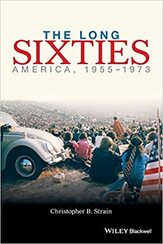
The Long Sixties: America, 1955 - 1973
by Christopher B. Strain The Long Sixties is a concise and engaging treatment of the major political, social, and cultural developments of this tumultuous period.
|
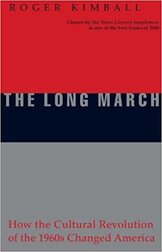
The Long March: How the Cultural Revolution of the 1960s Changed America
by Roger Kimball In The Long March, Roger Kimball, the author of Tenured Radicals, shows how the "cultural revolution" of the 1960s and '70s took hold in America, lodging in our hearts and minds, and affecting our innermost assumptions about what counts as the good life. Kimball believes that the counterculture transformed high culture as well as our everyday life in terms of attitudes toward self and country, sex and drugs, and manners and morality. Believing that this dramatic change "cannot be understood apart from the seductive personalities who articulated its goals," he intersperses his argument with incisive portraits of the life and thought of Allen Ginsberg, Norman Mailer, Timothy Leary, Susan Sontag, Eldridge Cleaver and other "cultural revolutionaries" who made their mark. For all that has been written about the counterculture, until now there has not been a chronicle of how this revolutionary movement succeeded and how its ideas helped provoke today's "culture wars." The Long March fills this gap with a compelling and well-informed narrative that is sure to provoke discussion and debate. |
1970–2001 End of the 20th Century
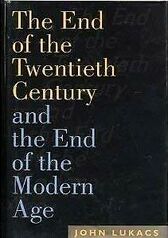
The End of the Twentieth Century and the End of the Modern Age
by John Lukacs Historian John Lukacs's brilliant new book offers a provocative summing-up of the twentieth century, that age of iron which began with the guns of August in 1914 and ended with the collapse of the Soviet Union in 1989. Distinguished by its author's masterly style and command of detail, The End of the Twentieth Century is a startling examination of where we are today, how we got here, and where we are headed. Centering on Europe, America, and the relations between the two, Lukacs argues that the major battle of our time has been waged between forms of nationalism rather than between communism and democracy; that the great watershed events have been the two world wars, not the Russian Revolution; and that the century's radical revolutionary was neither Lenin nor Chairman Mao but Adolf Hitler. The book puts into sharp perspective such events as the collapse of the Soviet Union, the civil war raging in what was Yugoslavia, and the resurgence of right-wing politics in a reunited Germany. Rather than the end of history, we are now witnessing the end of the modern era, and what awaits us is not the triumphal reign of liberal democracy but a troubled time that may echo much that is most questionable in our age. Informed by the precision and insight that have made Lukacs a leading historian, The End of the Twentieth Century is a reckoning both personal and professional - at once a brilliant rebuttal to Francis Fukuyama's The End of History and an outstanding, if sobering, work of historical mediation. 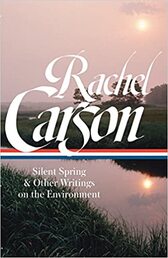
Rachel Carson: Silent Spring & Other Writings on the Environment
by Rachel Carson The book that sparked the modern environmental movement, with an unprecedented collection of letters, speeches, and other writings that reveal the extraordinary courage and vision of its author Library of America launches its Rachel Carson edition with this deluxe illustrated volume presenting one of the landmark books of the twentieth century together with rare letters, speeches, and other writings that reveal the personal courage and passionate commitment of its author. A huge bestseller when published in September 1962, Silent Spring led not only to many of the laws and government agencies that protect our air, land, and water, but prompted a revolution in environmental consciousness. Now for the first time, in previously unpublished and newly collected letters to biochemists, ecologists, cancer specialists, ornithologists, and other experts, Carson's groundbreaking expose of the unintended consequences of pesticide use comes together piece-by-piece, like a puzzle or detective story. She makes common cause with conservationists and other allies to build public awareness, hiding her private battle with cancer for fear it might distract from her message. And in the wake of her book's astonishing impact, as she becomes the target of an organized campaign of disinformation by the chemical industry, Carson speaks out in defense of her findings while remaining a model of grace under pressure. Throughout the collection, Carson's lifelong love of nature shines through. In writings both lyrical and intensely moving, she conveys her "sense of wonder" to her young nephew, dreams of conserving old-growth forest in Maine for posterity, and recounts her adventures and epiphanies as birdwatcher and beachcomber. A future companion volume will gather Carson's "sea trilogy": Under the Sea-Wind (1941), The Sea Around Us (1951), and The Edge of the Sea (1955). 
Fields Without Dreams : Defending the Agrarian Ideal
by Victor Davis Hanson Eulogizing the vanishing lifestyle of the family farm, Victor Hanson calls for America to take notice of its lost simplicity and purity before it is too late. "Victor Davis Hanson . . . is a writer as much as a farmer. His memoir is complex--passionate, angry, honest, scorching".--Jane Smiley, "The New Yorker". |
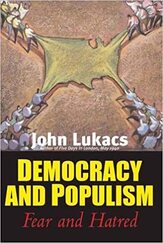
Democracy and Populism: Fear and Hatred
by John Lukacs This intensely interesting—and troubling—book is the product of a lifetime of reflection and study of democracy. In it, John Lukacs addresses the questions of how our democracy has changed and why we have become vulnerable to the shallowest possible demagoguery. Lukacs contrasts the political systems, movements, and ideologies that have bedeviled the twentieth century: democracy, Liberalism, nationalism, fascism, Bolshevism, National Socialism, populism. Reflecting on American democracy, Lukacs describes its evolution from the eighteenth century to its current form—a dangerous and possibly irreversible populism. This involves, among other things, the predominance of popular sentiment over what used to be public opinion. This devolution has happened through the gigantic machinery of publicity, substituting propaganda—and entertainment—for knowledge, and ideology for a sense of history. It is a kind of populism that relies on nationalism and militarism to hold society together. Lukacs’s observations are original, biting, timely, sure to inspire lively debate about the precarious state of American democracy today. 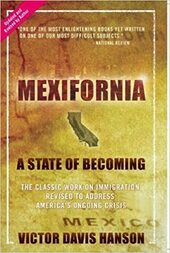
Mexifornia: A State of Becoming
by Victor Davis Hanson Massive illegal immigration from Mexico into California, Victor Davis Hanson writes, "coupled with a loss of confidence in the old melting pot model of transforming newcomers into Americans, is changing the very nature of state. Yet we Californians have been inadequate in meeting this challenge, both failing to control our borders with Mexico and to integrate the new alien population into our mainstream." Part history, part political analysis, and part memoir, "Mexifornia" is an intensely personal work by one of our most important writers. Hanson is perhaps known best for his military histories and especially his social commentary about America and its response to terror after 9/11. But he is also a fifth-generation Californian who runs a family farm in the Central Valley and has written eloquent elegies for the decline of the small farm such as "Fields Without Dreams" and "The Land Was Everything." Like these books, "Mexifornia" is an intensely personal look at what has changed in California over the last quarter century. In this case, however, Hanson's focus is on how not only California, the Southwest, and indeed the entire nation has been affected by America's hemorrhaging borders and how those hurt worst are the Mexican immigrants themselves. A large part of the problem, Hanson believes, comes from the opportunistic coalition that stymies immigration reform and, even worse, stifles an honest discussion of a growing problem. Conservative corporations, contractors, and agribusiness demand cheap wage labor from Mexico, whatever the social consequences. Meanwhile, "progressive" academics, journalists, government bureaucrats, and La Raza advocates envision illegal aliens as a vast new political constituency for those committed to the notion that victimhood, not citizenship, is the key to advancement. The problems Hanson identifies may have reached critical mass in California, but they affect Americans who inhabit "Mexizona," "Mexichusetts" and other states of becoming. Hanson writes wistfully about his own growing up in the Central Valley when he was one of a handful of non-Hispanics in his elementary school and when his teachers saw it as their mission to give all students, Hispanic and "white" alike, a passport to the American Dream. He follows the fortunes of Hispanic friends he has known all his life--how they have succeeded in America and how they regard the immigration crisis. But if "Mexifornia" is emotionally generous at the strength and durability of the groups that have made California strong, it is also an indictment of the policies that got California into its present mess. But in the end, Hanson strongly believes that our traditions of assimilation, integration, and intermarriage may yet remedy a problem that the politicians and ideologues have allowed to get out of hand. |
The 21st Century
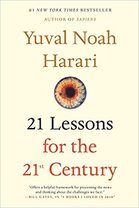
21 Lessons for the 21st Century
by Yuval Noah Harari How do computers and robots change the meaning of being human? How do we deal with the epidemic of fake news? Are nations and religions still relevant? What should we teach our children? Yuval Noah Harari’s 21 Lessons for the 21st Century is a probing and visionary investigation into today’s most urgent issues as we move into the uncharted territory of the future. As technology advances faster than our understanding of it, hacking becomes a tactic of war, and the world feels more polarized than ever, Harari addresses the challenge of navigating life in the face of constant and disorienting change and raises the important questions we need to ask ourselves in order to survive. In twenty-one accessible chapters that are both provocative and profound, Harari builds on the ideas explored in his previous books, untangling political, technological, social, and existential issues and offering advice on how to prepare for a very different future from the world we now live in: How can we retain freedom of choice when Big Data is watching us? What will the future workforce look like, and how should we ready ourselves for it? How should we deal with the threat of terrorism? Why is liberal democracy in crisis? Harari’s unique ability to make sense of where we have come from and where we are going has captured the imaginations of millions of readers. Here he invites us to consider values, meaning, and personal engagement in a world full of noise and uncertainty. When we are deluged with irrelevant information, clarity is power. Presenting complex contemporary challenges clearly and accessibly, 21 Lessons for the 21st Century is essential reading. 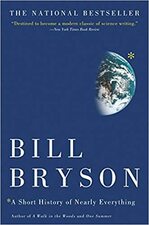
A Short History of Nearly Everything
by Bill Bryson One of the world’s most beloved writers and New York Times bestselling author of A Walk in the Woods and The Body takes his ultimate journey—into the most intriguing and intractable questions that science seeks to answer. In A Walk in the Woods, Bill Bryson trekked the Appalachian Trail--well, most of it. In A Sunburned Country, he confronted some of the most lethal wildlife Australia has to offer. Now, in his biggest book, he confronts his greatest challenge: to understand--and, if possible, answer--the oldest, biggest questions we have posed about the universe and ourselves. Taking as territory everything from the Big Bang to the rise of civilization, Bryson seeks to understand how we got from there being nothing at all to there being us. To that end, he has attached himself to a host of the world’s most advanced (and often obsessed) archaeologists, anthropologists, and mathematicians, travelling to their offices, laboratories, and field camps. He has read (or tried to read) their books, pestered them with questions, apprenticed himself to their powerful minds. A Short History of Nearly Everything is the record of this quest, and it is a sometimes profound, sometimes funny, and always supremely clear and entertaining adventure in the realms of human knowledge, as only Bill Bryson can render it. Science has never been more involving or entertaining. 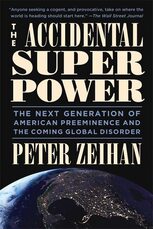
The Accidental Superpower: The Next Generation of American Preeminence and the Coming Global Disorder
by Mr. Peter Zeihan An eye-opening assement of American power and deglobalization in the bestselling tradition of The World is Flat and The Next 100 Years. Near the end of the Second World War, the United States made a bold strategic gambit that rewired the international system. Empires were abolished and replaced by a global arrangement enforced by the U.S. Navy. With all the world's oceans safe for the first time in history, markets and resources were made available for everyone. Enemies became partners. We think of this system as normal - it is not. We live in an artificial world on borrowed time. In The Accidental Superpower, international strategist Peter Zeihan examines how the hard rules of geography are eroding the American commitment to free trade; how much of the planet is aging into a mass retirement that will enervate markets and capital supplies; and how, against all odds, it is the ever-ravenous American economy that - alone among the developed nations - is rapidly approaching energy independence. Combined, these factors are doing nothing less than overturning the global system and ushering in a new (dis)order. For most, that is a disaster-in-waiting, but not for the Americans. The shale revolution allows Americans to sidestep an increasingly dangerous energy market. Only the United States boasts a youth population large enough to escape the sucking maw of global aging. Most important, geography will matter more than ever in a de-globalizing world, and America's geography is simply sublime. 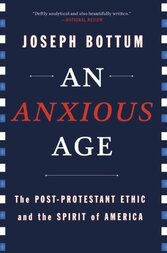
An Anxious Age: The Post-Protestant Ethic and the Spirit of America
by Joseph Bottum We live in a profoundly spiritual age--but in a very strange way, different from every other moment of our history. Huge swaths of American culture are driven by manic spiritual anxiety and relentless supernatural worry. Radicals and traditionalists, liberals and conservatives, together with politicians, artists, environmentalists, followers of food fads, and the chattering classes of television commentators: America is filled with people frantically seeking confirmation of their own essential goodness. We are a nation desperate to stand on the side of morality--to know that we are righteous and dwell in the light. Or so Joseph Bottum argues in An Anxious Age, an account of modern America as a morality tale, formed by its spiritual disturbances. And the cause, he claims, is the most significant and least noticed historical fact of the last fifty years: the collapse of the Mainline Protestant churches that were the source of social consensus and cultural unity. Our dangerous spiritual anxieties, broken loose from the churches that once contained them, now madden everything in American life. Updating The Protestant Ethic and the Spirit of Capitalism, Max Weber's sociological classic, An Anxious Age undertakes two case studies in contemporary social class, adrift in a nation without the religious understandings that gave it meaning. Looking at the college-educated elite he calls "The Poster Children," Bottum sees the post-Protestant heirs of the old Mainline Protestant domination of culture: dutiful descendants who claim the high social position of their Christian ancestors even while they reject their ancestors' Christianity. Turning to "The Swallows of Capistrano," the Catholics formed by the pontificate of John Paul II, Bottum evaluates the early victories--and later defeats--of the attempt to substitute Catholicism for the dying Mainline voice in public life. Sweeping across American intellectual and cultural history, An Anxious Age traces the course of national religion and warns about the strange angels and even stranger demons with which we now wrestle. Insightful and contrarian, wise and unexpected, An Anxious Age ranks among the great modern accounts of American culture. 
Virtue Hoarders: The Case against the Professional Managerial Class (Forerunners: Ideas First)
by Catherine Liu A denunciation of the credentialed elite class that serves capitalism while insisting on its own progressive heroism Professional Managerial Class (PMC) elite workers labor in a world of performative identity and virtue signaling, publicizing an ability to do ordinary things in fundamentally superior ways. Author Catherine Liu shows how the PMC stands in the way of social justice and economic redistribution by promoting meritocracy, philanthropy, and other self-serving operations to abet an individualist path to a better world. Virtue Hoarders is an unapologetically polemical call to reject making a virtue out of taste and consumption habits. Forerunners: Ideas First is a thought-in-process series of breakthrough digital publications. Written between fresh ideas and finished books, Forerunners draws on scholarly work initiated in notable blogs, social media, conference plenaries, journal articles, and the synergy of academic exchange. This is gray literature publishing: where intense thinking, change, and speculation take place in scholarship. |
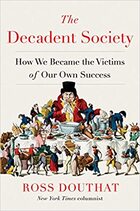
The Decadent Society: How We Became the Victims of Our Own Success
by Ross Douthat Today the Western world seems to be in crisis. But beneath our social media frenzy and reality television politics, the deeper reality is one of drift, repetition, and dead ends. The Decadent Society explains what happens when a rich and powerful society ceases advancing—how the combination of wealth and technological proficiency with economic stagnation, political stalemates, cultural exhaustion, and demographic decline creates a strange kind of “sustainable decadence,” a civilizational languor that could endure for longer than we think. Ranging from our grounded space shuttles to our Silicon Valley villains, from our blandly recycled film and television—a new Star Wars saga, another Star Trek series, the fifth Terminator sequel—to the escapism we’re furiously chasing through drug use and virtual reality, Ross Douthat argues that many of today’s discontents and derangements reflect a sense of futility and disappointment—a feeling that the future was not what was promised, that the frontiers have all been closed, and that the paths forward lead only to the grave. In this environment we fear catastrophe, but in a certain way we also pine for it—because the alternative is to accept that we are permanently decadent: aging, comfortable and stuck, cut off from the past and no longer confident in the future, spurning both memory and ambition while we wait for some saving innovation or revelations, growing old unhappily together in the glowing light of tiny screens. Correcting both optimists who insist that we’re just growing richer and happier with every passing year and pessimists who expect collapse any moment, Douthat provides an enlightening diagnosis of the modern condition—how we got here, how long our age of frustration might last, and how, whether in renaissance or catastrophe, our decadence might ultimately end. 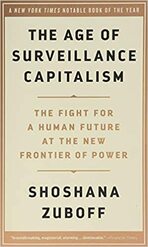
The Age of Surveillance Capitalism: The Fight for a Human Future at the New Frontier of Power
by Shoshana Zuboff The challenges to humanity posed by the digital future, the first detailed examination of the unprecedented form of power called "surveillance capitalism," and the quest by powerful corporations to predict and control our behavior. In this masterwork of original thinking and research, Shoshana Zuboff provides startling insights into the phenomenon that she has named surveillance capitalism. The stakes could not be higher: a global architecture of behavior modification threatens human nature in the twenty-first century just as industrial capitalism disfigured the natural world in the twentieth. Zuboff vividly brings to life the consequences as surveillance capitalism advances from Silicon Valley into every economic sector. Vast wealth and power are accumulated in ominous new "behavioral futures markets," where predictions about our behavior are bought and sold, and the production of goods and services is subordinated to a new "means of behavioral modification." The threat has shifted from a totalitarian Big Brother state to a ubiquitous digital architecture: a "Big Other" operating in the interests of surveillance capital. Here is the crucible of an unprecedented form of power marked by extreme concentrations of knowledge and free from democratic oversight. Zuboff's comprehensive and moving analysis lays bare the threats to twenty-first century society: a controlled "hive" of total connection that seduces with promises of total certainty for maximum profit -- at the expense of democracy, freedom, and our human future. With little resistance from law or society, surveillance capitalism is on the verge of dominating the social order and shaping the digital future -- if we let it. 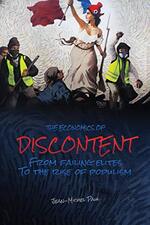
The Economics of Discontent: From Failing Elites to The Rise of Populism
by Jean-Michel Paul The social contract that has underpinned growth and political stability in the Western world since World War II has broken down. Houses, health care and higher education have become unaffordable to a majority of people, while the burden of unregulated monopolies, globalization and uncontrolled immigration has fallen disproportionately on the lower and middle classes. Wrapped in political correctness, an increasingly out of touch Western elite continues catering to special interests and fails to grasp the urgency for change. Populist movements harnessing public anger appear unable to propose and implement effective solutions. The last financial crisis was bad enough. But the next crisis will spread deeper and wider. And yet we stand economically, politically and most of all intellectually unprepared. This book is the story of how we have arrived at the brink of disaster and how we can move away from the win-lose policies of recent decades to restore much-needed balance. 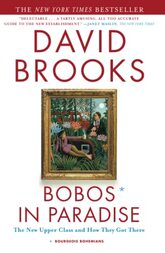
Bobos In Paradise: The New Upper Class and How They Got There
by David Brooks In his bestselling work of “comic sociology,” David Brooks coins a new word, Bobo, to describe today’s upper class—those who have wed the bourgeois world of capitalist enterprise to the hippie values of the bohemian counterculture. Their hybrid lifestyle is the atmosphere we breathe, and in this witty and serious look at the cultural consequences of the information age, Brooks has defined a new generation. Do you believe that spending $15,000 on a media center is vulgar, but that spending $15,000 on a slate shower stall is a sign that you are at one with the Zenlike rhythms of nature? Do you work for one of those visionary software companies where people come to work wearing hiking boots and glacier glasses, as if a wall of ice were about to come sliding through the parking lot? If so, you might be a Bobo. 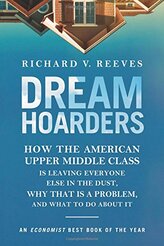
Dream Hoarders: How the American Upper Middle Class Is Leaving Everyone Else in the Dust, Why That Is a Problem, and What to Do About It
by Richard V. Reeves Dream Hoarders sparked a national conversation on the dangerous separation between the upper middle class and everyone else. Now in paperback and newly updated for the age of Trump, Brookings Institution senior fellow Richard Reeves is continuing to challenge the class system in America. In America, everyone knows that the top 1 percent are the villains. The rest of us, the 99 percent—we are the good guys. Not so, argues Reeves. The real class divide is not between the upper class and the upper middle class: it is between the upper middle class and everyone else. The separation of the upper middle class from everyone else is both economic and social, and the practice of “opportunity hoarding”—gaining exclusive access to scarce resources—is especially prevalent among parents who want to perpetuate privilege to the benefit of their children. While many families believe this is just good parenting, it is actually hurting others by reducing their chances of securing these opportunities. There is a glass floor created for each affluent child helped by his or her wealthy, stable family. That glass floor is a glass ceiling for another child. Throughout Dream Hoarders, Reeves explores the creation and perpetuation of opportunity hoarding, and what should be done to stop it, including controversial solutions such as ending legacy admissions to school. He offers specific steps toward reducing inequality and asks the upper middle class to pay for it. Convinced of their merit, members of the upper middle class believes they are entitled to those tax breaks and hoarded opportunities. After all, they aren’t the 1 percent. The national obsession with the super rich allows the upper middle class to convince themselves that they are just like the rest of America. In Dream Hoarders, Reeves argues that in many ways, they are worse, and that changes in policy and social conscience are the only way to fix the broken system. |